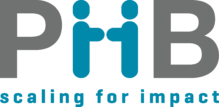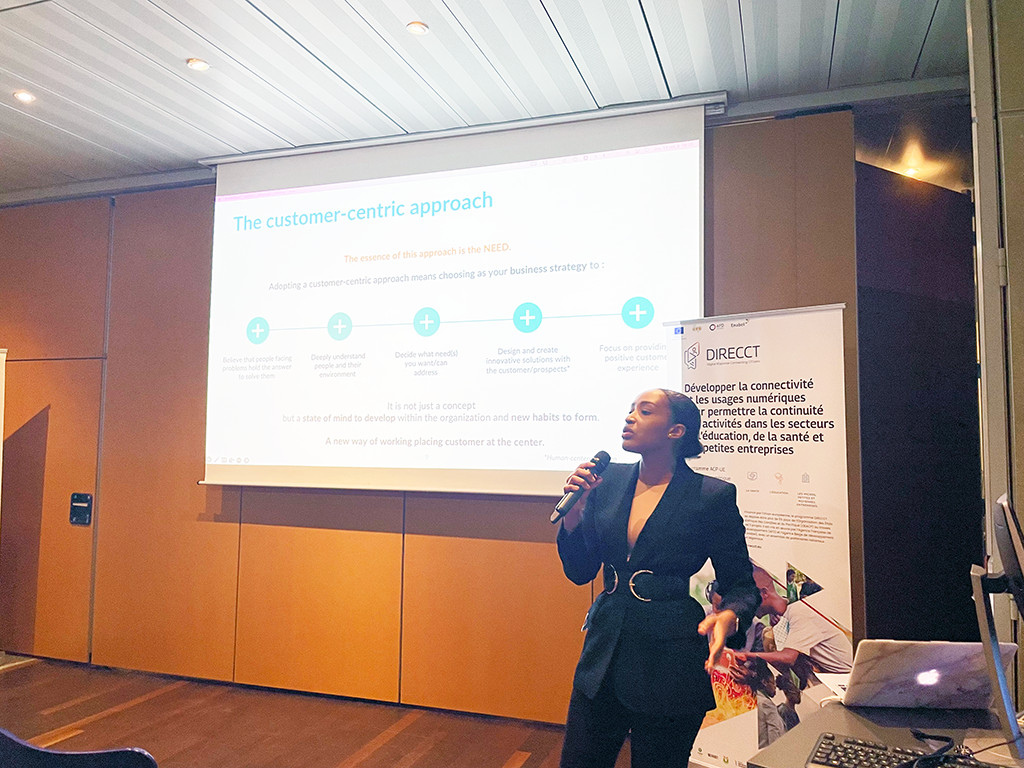
What is the key ingredient to a successful digital transformation? A customer-centric approach
It is no secret that microfinance institutions (MFIs) are driven to digitize or die… […]
It is no secret that microfinance institutions (MFIs) are driven to digitize or die… the challenge is that some are doing both!
In order to avoid common pitfalls of focusing exclusively on the technological solutions, PHB has always stressed the human element and the importance of customer centricity. PHB's experience in supporting numerous MFIs in their successful digital transformation confirms the importance of involving not only MFI management, but also all stakeholders: field teams in direct contact with customers (loan officers, savings collectors, etc.), customers themselves -who should be involved throughout the process in a collaborative approach (Human Centric Design)-, and technical partners (mobile phone provider, fintech, technical providers).
Aligning stakeholders with divergent interests requires a common vision. The strategy (vision, key axes, desired impact, key success factors) must precede the roadmap. As this CGAP article reminds us, the change in corporate culture -that digital transformation requires- is a long process.
PHB supported the microfinance institution ALIDé in Benin between 2017 and 2018, with the support of UNCDF, to digitize its loan repayments and savings collection. ALIDé was then the first Beninese MFI to launch a bank to wallet service allowing customers to link their electronic wallet to their ALIDé account to send money from their phone to their MFI account and vice versa.
In Senegal, Burkina, Uganda, and Zambia, where we have supported other MFIs in their digital transformation (Caurie, FINCA, and Pamecas, among others), the process also took between 18 and 24 months. It may seem long, however we are talking about an in-depth transformation of the organization, its culture, and its processes: “Digital transformation does not happen overnight. It is a complex process involving multiple players with different technical profiles and sometimes conflicting interests”. (CGAP)
Between 2021 and 2022, PHB also supported the MFI ACEP in Burkina Faso in its digital transformation. We embarked on a journey with the entire staff of the MFI, not only top and middle management, but also field agents and team leaders, through a course created by PHB Academy, to familiarize them with an approach centered on client. It consisted of immersing oneself in the client’s life to better understand their needs through in-depth interview and observations done at the client’s home or workplace. This enabled ACEP to identify a need for savings products, accessible via digital channels, to meet the clients’ aspirations to save money for their business, their family, and the future of their children.
Through a collaborative approach involving the MFI, customers and the mobile phone operator, four savings products have been developed, accessible at ACEP branches, via customers' mobile phones (mobile money account connected to the customer's account within the MFI), and via collectors (field agents equipped with tablets, responsible for collecting money from clients at their place of work to credit it to their savings account). After a six-month pilot and based upon the results obtained through customer feedback, two products and one channel were ruled out before large-scale deployment. The adoption rate of these new products and channels has exceeded expectations, particularly for the mobile money channel.
Today, all these institutions have transformed the way they work and interact with their clients. Indeed, our objective at PHB is to support MFIs in digital transformation and human-centered approach not as "fashionable" concepts but to support the wholistic transformation of the institution’s culture by developing a new state of mind and new work habits that place the client and their needs at the center of what the institution does.
Stay tuned for more on PHB’s experience with digital transformation journey.
Photo by Markus Spiske on Unsplash
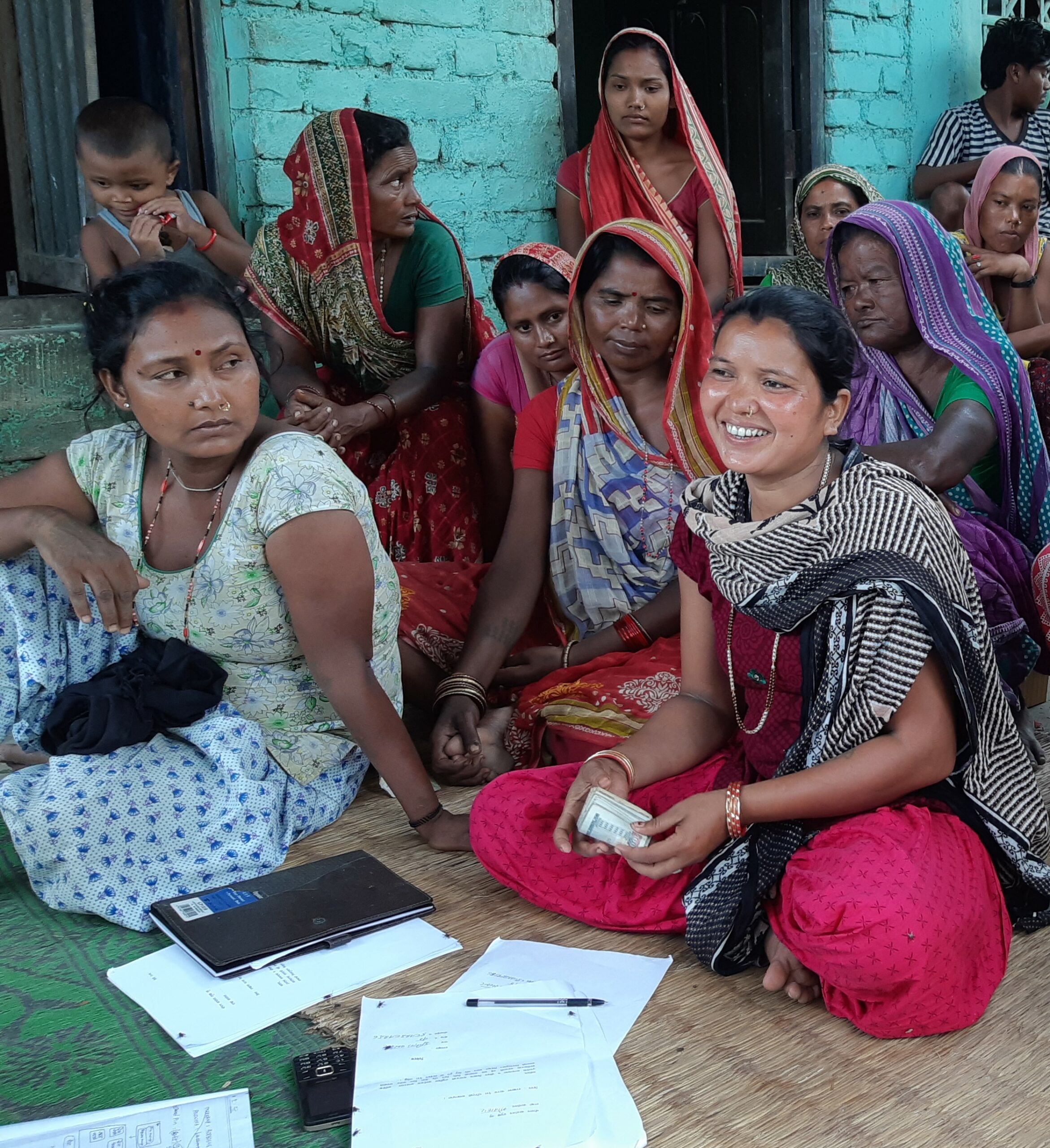
If the Gender Gap for financial inclusion is improving – why do we still have so much evidence to the contrary?
The recent Global Findex indicates that the gender gap in access to financial services has […]
The recent Global Findex indicates that the gender gap in access to financial services has shrunk from 9 per cent in 2011 to 6 per cent 10 years later. Nevertheless, the problems persist – especially when related to usage. Access is not enough, and although the gap has reduced between 2017 and 2021, women are still 2 per cent more likely to have an inactive account than men, 8 per cent vs 6 per cent, respectively.
Multiple barriers to women's financial inclusion
Disparities in education, social norms, and deprivation itself are the most significant barriers to women's financial inclusion; there are still "n" numbers of barriers, particularly for the women who are severely poor, live in remote locations, or more commonly those who face the challenge of balancing their responsibilities at home and work, whether that work is in the field or the storefront. Women face barriers on all sides, including:
Demand-side barriers like the lack of time to visit a bank, especially for those who live in remote or mountainous locations. Even if they have time, these women cannot afford transportation because they don't have jobs or sources of revenue. These obstacles are compounded by the digital divide and the reality that most women lack access to digital devices, which are necessary to access and use digital financial services like mobile banking and mobile money.
And those fortunate women who may have access to technology may lack the digital literacy to use it. So, just like access is not enough as it relates to financial inclusion, having a phone is insufficient if women must rely on their husbands or children to manipulate it for them. Ultimately, even if a woman has a phone and an account, she may not use financial services if she does not have a sustainable and unfettered source of income.
Supply-side barriers (Banks/ Financial Service providers), Most banks, globally – are profit–driven except for a few specialized government-owned developments or agriculture banks. Microfinance institutions often serve a predominantly female customer base. Still, marginalized women who lack time, knowledge and money are of less value when considering the cost associated with maintaining low-value accounts.
Policy/ Government side, in many markets, a significant barrier for women is their inability to get identification documents. Although the advent of digital identity is much talked about, it is still the women who are least likely to be the early adopters of this innovation. Some countries continue to uphold formal statutes that may expressly forbid women from obtaining credit facilities or require stringent collateral that women may not have (e.g. land). Incentives to invest may also be undermined by customary laws. Even when this is not the case, women frequently lack or do not have access to the documentation required to open an account.
For instance, they might not have a driver's license or be listed as the owner or payer of bills. According to World Bank data, in 2014, 2 billion individuals lacked a legal form of identification (World Bank, 2015). There were disproportionately more women among them. Inheritance laws, for example, may be unfairly slanted in favour of men, preventing women from owning property that may be used as collateral (Luz, 2020).
Social barriers, such as cultural or social norms defining what is acceptable for women to do, where they can go alone, and with whom they can interact, also limit women's access to financial services. World Bank data shows that 30 per cent of economies still restrict women's mobility.
Empowerment of women, creation of policies, and implementation
To address the myriad challenges women face, policymakers and regulators have a crucial role in empowering women.
When we talk about women empowerment, "it does not imply taking more power away from men and then giving it to women; rather, it refers to efforts to strike a balance to bring about a very inclusive development, even in case of financial inclusion", said Ms Eden Dema, a financial inclusion policy and gender specialist at PHB.
Effective legislation and policies can eliminate the hidden biases that frequently prevent women from using and accessing financial services. However, tackling social and cultural norms is the most challenging since they are firmly ingrained in the culture of that particular society, making it impossible for policymakers to address them through regulations, the introduction of goods, or the provision of services. According to Ms Dema, "Challenges from sociocultural norms should be addressed at multiple levels to achieve meaningful results. Interventions should be pragmatic as issues are deeply embedded within society. To bring about change, we need to change people’s mindset first."
In the end, the policymaker's first prerequisite to overcoming the barriers to women's inclusion is to bring together all stakeholders, such as financial service providers and government policymakers, to pursue one common goal of advancing women's financial inclusion. Each stakeholder has its mandate and goals, and cohesion and collaboration do not exist as we hope. While the central bank typically pursues the objective of developing a secure and inclusive financial sector, the ministry of women's affairs might prioritize gender equality. There could be "n" different reasons for women's disparity of access and usage of financial services – and the barriers, however indomitable, can be overcome through collaboration and focused attention on women's real and practical needs and aspirations.
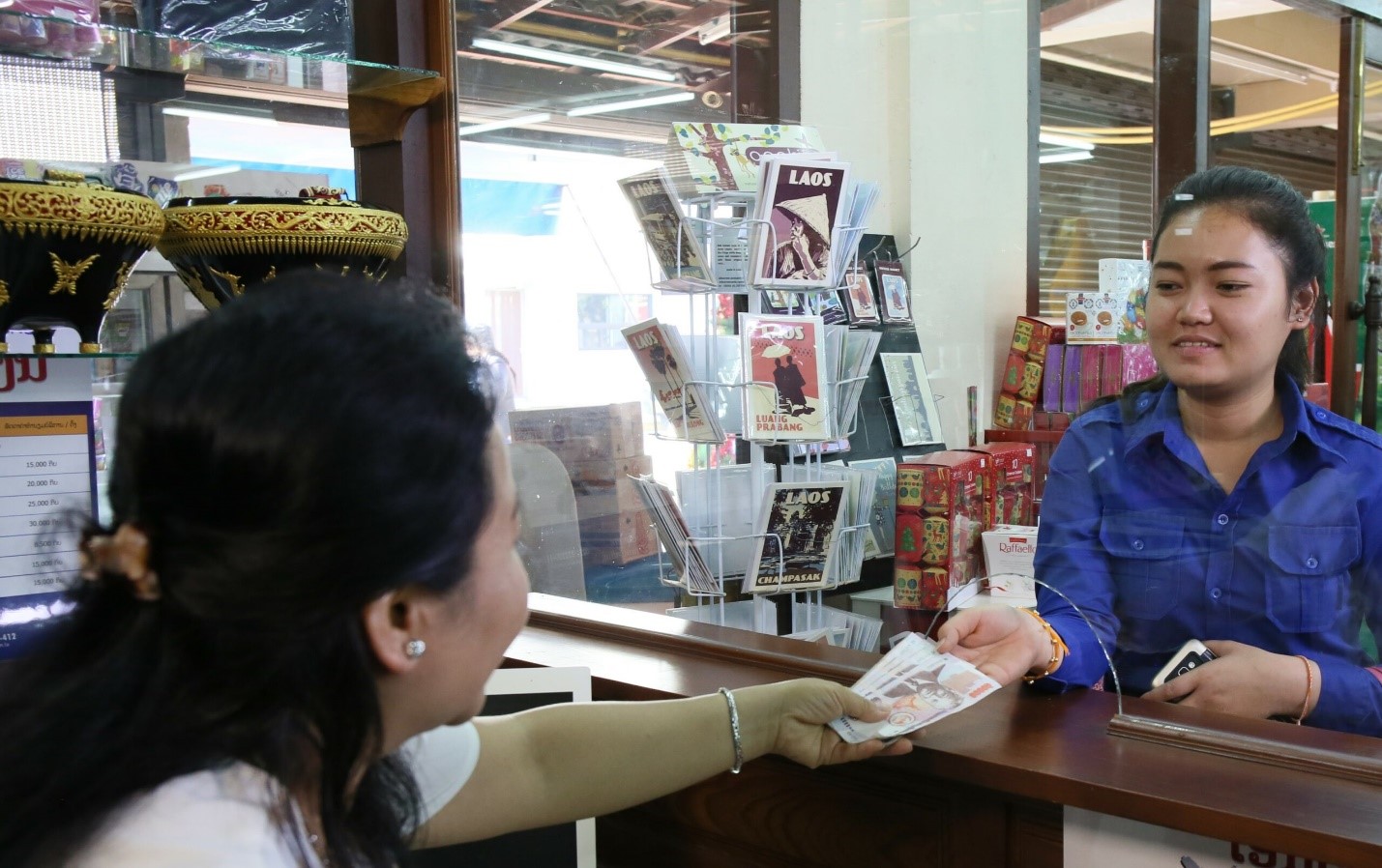
Fintech in Asia
The secret to advanced fintech in Southeast Asia’s poorest countries “Covid has catalysed digital payments […]
The secret to advanced fintech in Southeast Asia’s poorest countries
“Covid has catalysed digital payments around the world, and Laos is no exception,” said David Kleiman, a former UN Capital Development Fund digital finances and services expert in Laos, and now a consultant for developing economies at PHB Development. “There’s been a real push.”
This article is reproduced with permission from South East Asia Globe, June 28, 2021.

LEARNING TO SOLVE COMPLEX PROBLEMS USING SCRUM
Motivated by the desire to improve collaboration with our partners, we recently offered a Certified Scrum Master (CSM) training in Uganda.
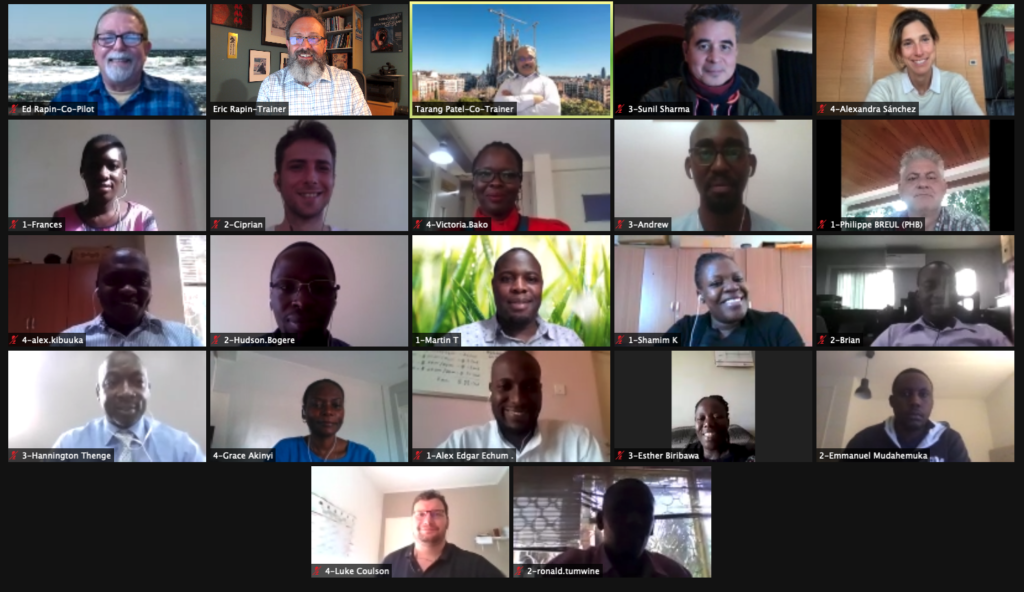
INSIGHTS FROM UGANDA
Motivated by the desire to improve collaboration with our partners, we recently offered a Certified Scrum Master (CSM) training in Uganda in partnership with Lucid Agile. Twenty participants from FINCA, Opportunity International and Opportunity Bank participated in the three-day online training - learning how to improve the turnaround time to deliver innovations and slice work into tasks that can be delivered incrementally. Collaborative interactions with our partners are central to PHB’s vision. Supporting appropriate skill development within our partner organizations will strengthen our work together by building upon the Agile Values of Courage, Focus, Openness, Respect and Commitment.
Eric Rapin of Lucid Agile facilitated the training with the support of Tarang Patel and Ed Rapin to help the group understand and embed the Values into our work. “Some think that Scrum is for software developers only - but working with PHB and their clients was a great opportunity to reinforce the power of Scrum to bring collaboration in any team looking to solve complex problems and build value,” Eric said.
Utilizing a blend of case studies and Scrum theory, Eric was able to simplify the concepts through highly interactive sessions that required everyone to participate, share their thoughts and learn by doing. The online training provided an opportunity for certification for those who completed the 15 hours engagement over 3 days.
In the two months since completing the training, nearly all participants from across the various departments are engaging with this approach to organizing themselves and their work to deliver greater benefits.
For this group – previously unexposed to Agile and Scrum project management – Scrum has become a weekly affair that starts with identifying assignments, delegating team roles, mapping the product backlog and executing sprints with the sprint review and sprint retrospective coming at the end of the week. With each new assignment, Scrum team roles are rotated to foster familiarity with the different responsibilities. Daily scrums were initially considered “difficult” because of perceived time constraints soon became appreciated for instilling commitment, creating urgency, identifying constraints and developing positive feedback loops.
According to FINCA’s Head of Digital Transformation, “this CSM training has surely brought improvements to the way my team works – most notably by defining the expected outputs through a “definition of done” and then figuring out the best way to get it done – together.” One participant from Opportunity Bank is an ardent believer in Scrum, having used it for task prioritization - thus enabling his team to focus on what is most important and deliver more excellent value.
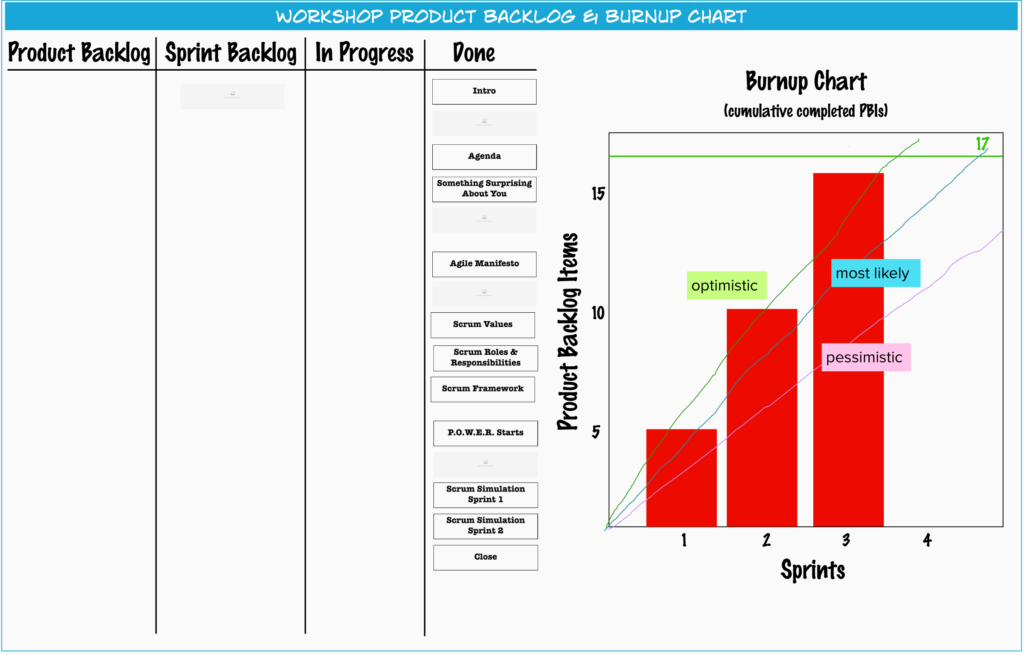
Scrum is not a methodology with lots of rules. Instead, it is a “lightweight framework” built upon the agile values that help teams to focus.
Like any new way of working, Scrum requires diligence and practice and yet should not become a chore or add to the burden of overstretched people. With continuous engagement, however, the staff of these institutions are re-calibrating themselves into efficient and self-organizing teams that can deliver systematically.
All participants have now completed their certification as Scrum Masters via the Scrum Alliance. By offering all actors a common language, skills, and attitudes - PHB is committed to helping them scale for impact.
If you are interested in participating in future training with PHB, contact us at academy@phbdevelopment.com
Story: Andrew Tumwesigye
Picture & graphics Credit: Eric Rapin
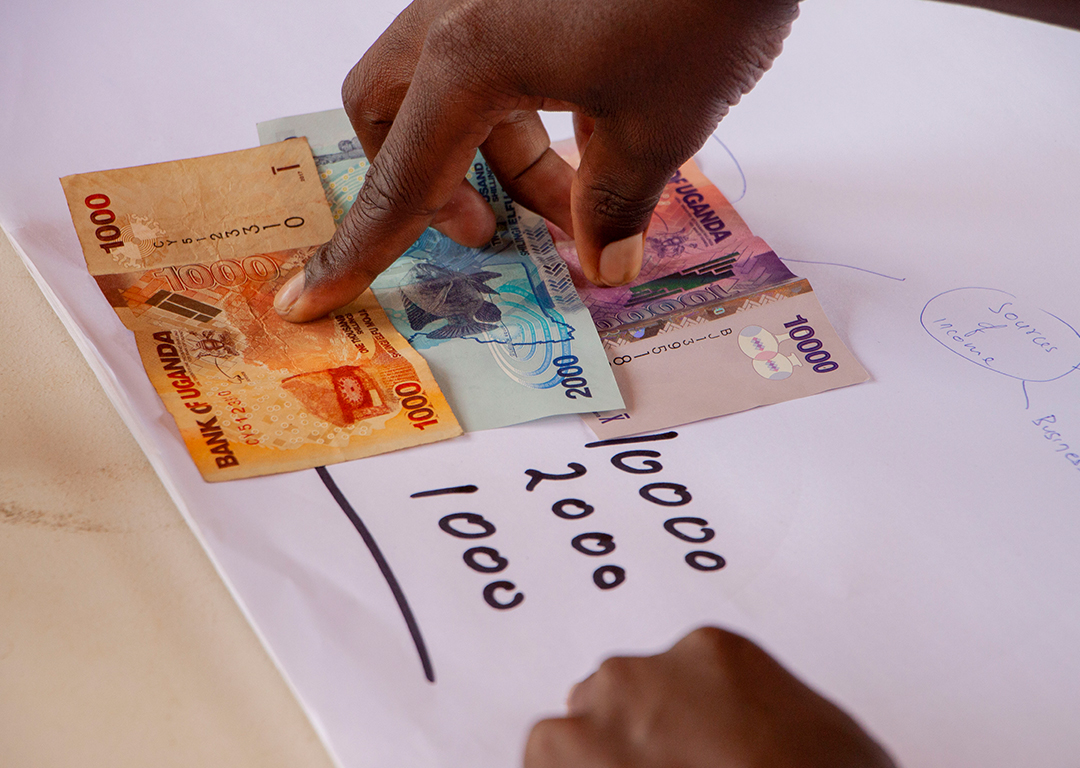
An investment in knowledge pays the best interest
Financial Literacy training for the refugees of Uganda. The international community has praised Uganda […]
Financial Literacy training for the refugees of Uganda.
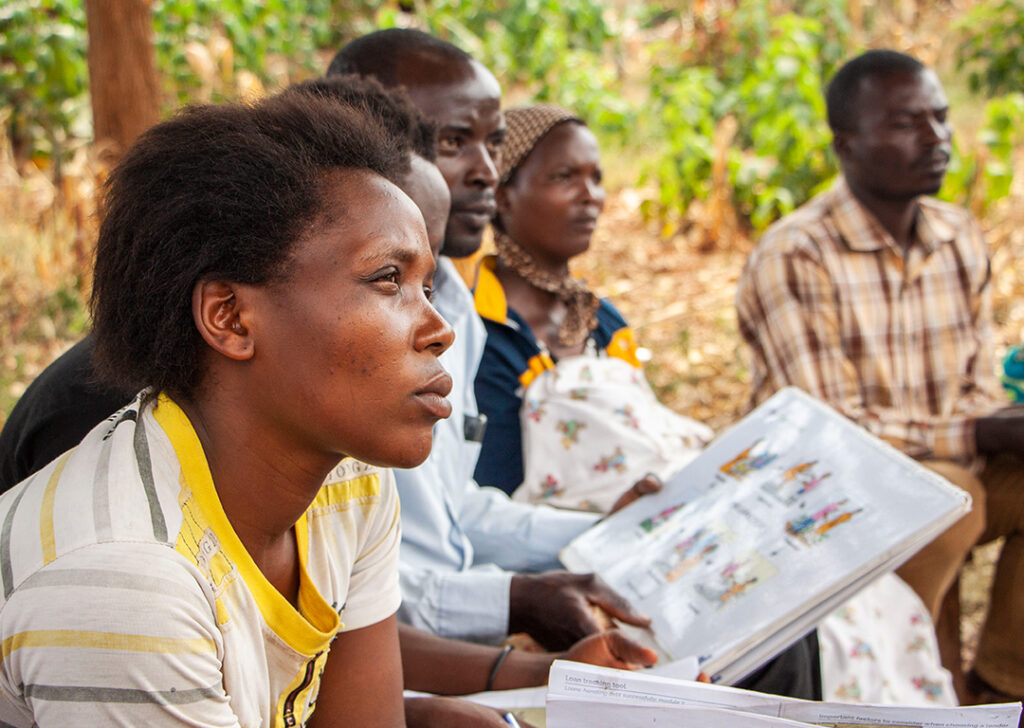
The international community has praised Uganda for having a progressive humanitarian policy of opening its borders to more than 1.4 million refugees from South Sudan, Democratic Republic of Congo, Burundi and Rwanda - making it the largest host nation on the African continent. The refugee population is not homogenous and represents people of many parts of Africa - with distinct cultural orientations and languages – united by their shared desire to lift themselves out of dependency and lead a self-reliant life.
To support this transition, WFP and other agencies are ramping up their cash-based interventions which allow vulnerable households to address their own needs and to make choices that improve their food and nutrition security. Each refugee receives monthly cash support of UGX 31,000 (US$ 8.46) from WFP. To optimally manage these resources, better financial awareness among refugees is paramount as the shift is taking place from food-based support to cash-based support.
In close collaboration with UNCDF, WFP and their partnering organizations Andre Foods international (AFI), Hunger Fighters Uganda (HFU) and The Adventist Development & Relief agency (ADRA), the PHB team designed a leaner and participatory focused financial literacy curriculum with supporting tools. The training aims to teach new habits that promote a positive behavioural change over time through practical exercises that encourage learning how to save and realistic goal setting.
The design team, led by Kristina Jervell was able to understand the challenges faced by the refugees in a foreign land away from the familiar environment of their homes. They applied human-centred design methods to identify gaps in the existing curriculums and testing the content fit with refugees in Nakivale, Rwamwanja, and Kiryandongo settlements. The team designed a training concept to answer the challenges of coming to terms with having to rebuild their lives from scratch in a new country with few resources at hand.
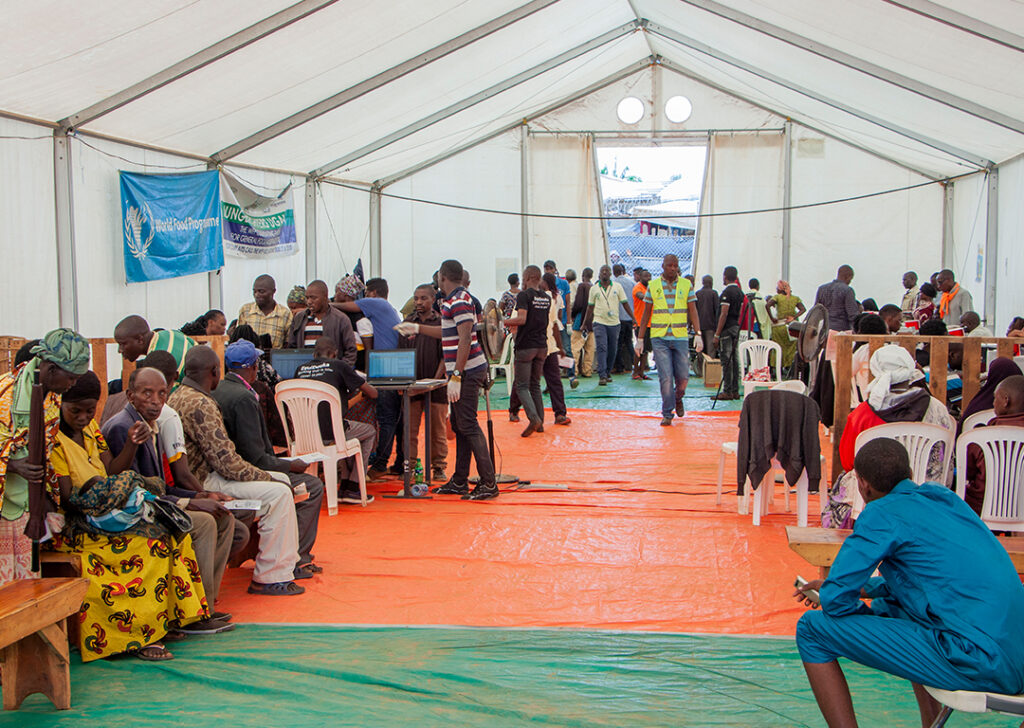
It is easy for refugees to become passive in the settlement environment, often overflowing with aid organizations offering training and support but asking for little commitment in return. The outcome is dependency and complacency in the long term. The design team identified early on that the training should only target highly motivated individuals who would commit to 80% participation without receiving any monetary or material incentives and that they are willing to purchase their stationaries. The program selected those expressing a deep desire for wanting to use this knowledge towards taking charge of their lives.
Rapid prototyping is a fast and efficient way of testing assumptions and concepts. So the team, therefore, did two pilots first with 60 and later 1800 participants, to adjust and subsequently validate the findings from the initial research phase, to understand how the training could be delivered to even larger cohorts.
Twentyone-year-old Idrissa lost contact with his father when he fled DRC. As one of the participants of the training, he shares his feeling with us, "Life was good back in Congo. I was schooling there. I lost my father during the war, not sure if he is dead or alive. Here, I cannot say we are in a good life. There are no jobs. We try to use our talents to make little money. Here I cannot plan for the future."
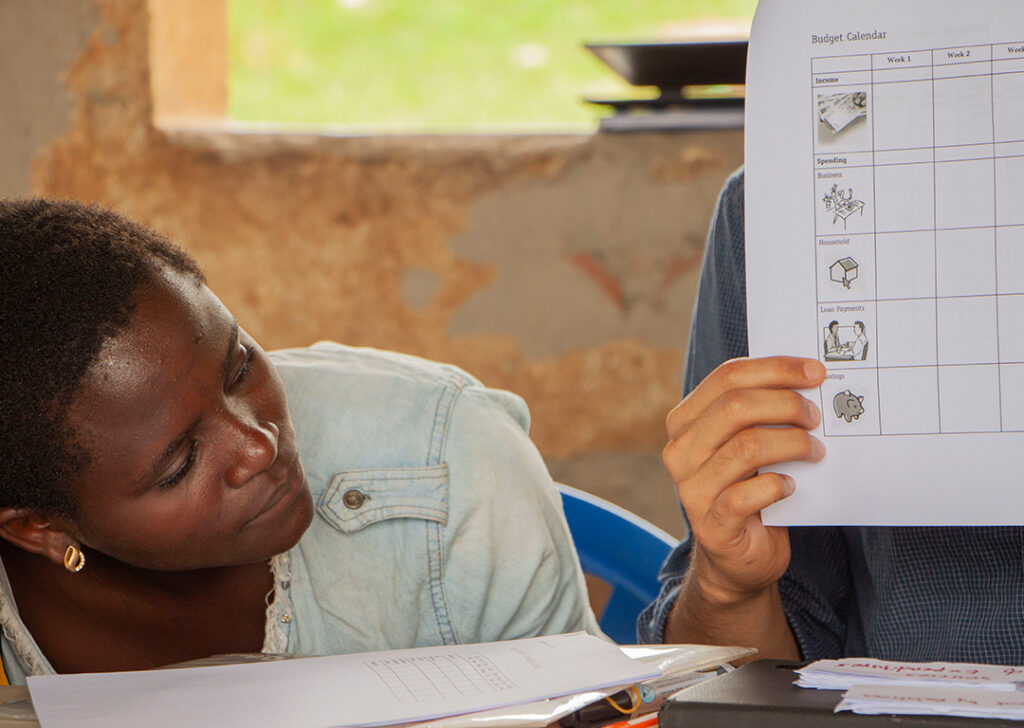
Further, to improve family dynamics, husband/wife or parent/child were paired up from each household, meeting for 2 hours, twice a week for the 5-week training period. They were quick to express their excitement of having learned how to budget, plan and save, realizing how it was already positively affecting their financial situation. Christine Nasafari, a participant from Nakivale settlement, never had any savings. She used to spend all her earning from her clothing business to care for her 11 children and never understood the importance of saving for the rainy days. After attending five weeks of Financial Literacy Training, she says "I wish I had this training ten years ago; my family would have been rich and living a perfect life now."
WFP is has seen the value of this sort of intervention and is now preparing to deliver the training, via a training of trainers approach, to 300,000 refugees across nine settlements in Uganda. Additionally, as the toolkit is open source and available online, WFP urges other organizations to use the training with the goal to reach as many people as possible and to have one universal curriculum to unify the efforts made by the stakeholders who are delivering cash assistance including Cash Working Group members.
This toolkit is a manifestation of the conviction that small but significant changes can create a long-term effect and help people regain control of their lives. The toolkit is empowering them to imagine a future as a contributing member of society, and not as a refugee.
The toolkit is available for download online in English, Kiswahili and Kinyabswisha.
Story and photos: Kristina Jervell
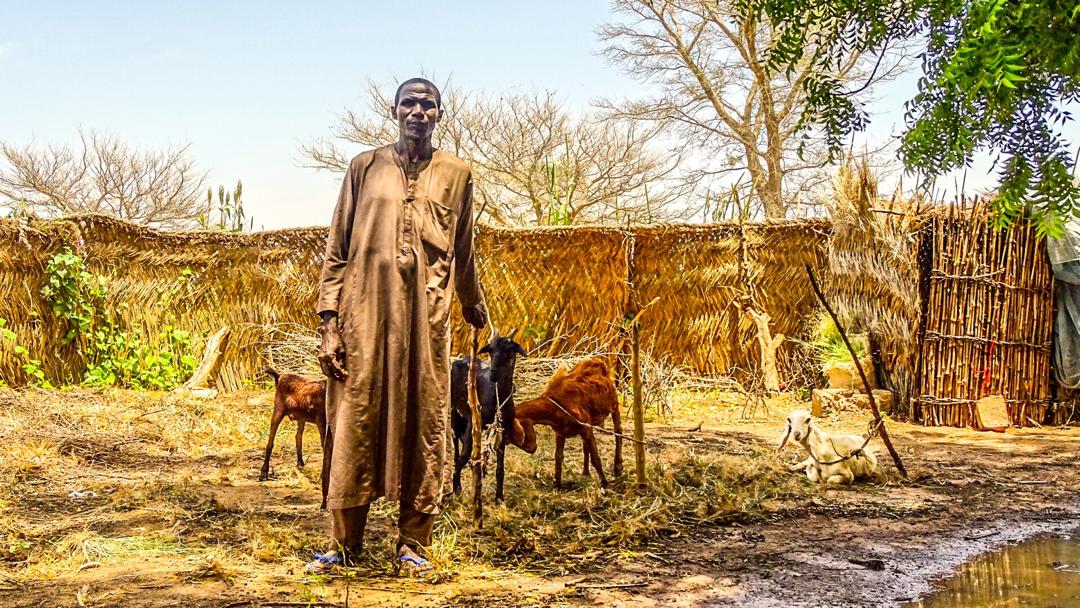
Mobile Money
Chronic drought and conflicts have brought widespread famine and misfortune to the land-locked West African country of Niger.
Mobile Money and the aspiration of entering a modern world
Chronic drought and conflicts have brought widespread famine and misfortune to the land-locked West African country of Niger. It is ranked among the bottom of the list of countries in the human development index and per capita income. Niger’s population has reached 18 million and growing at four per cent annually. Agriculture production falls short to feed its people, rendering more than 20 per cent of its population food insecure1.
Food insecurity is one of the leading causes of migration. Able-bodied people are fleeing to other places in search of better lives, leaving the elderly, young and the vulnerable behind to fend for themselves in this harsh land.
World Food Programme implemented cash incentives to promote food security in order to provide better living conditions for the needy. To receive this benefit, they have to use the proven WFP agriculture technique2. Beneficiaries receive US$55 a month for working their own field. To further scale this impact, WFP Niger and UNCDF have agreed to jointly work on digitizing social cash transfers to 10,000 households in vulnerable situations. UNCDF selected PHB Development and Innate Motion Motion to support the digitization efforts, by grasping the beneficiaries’ realities and needs, supporting the development of a reliable agent network and building capacities through tailored training.
The team first needed to understand the context more deeply through human-centric research and by speaking with people like Mikou Ango, a WFP beneficiary who said, “We want to be part of the modern world, but because we are poor, many people think we cannot; thus we keep on being excluded.”
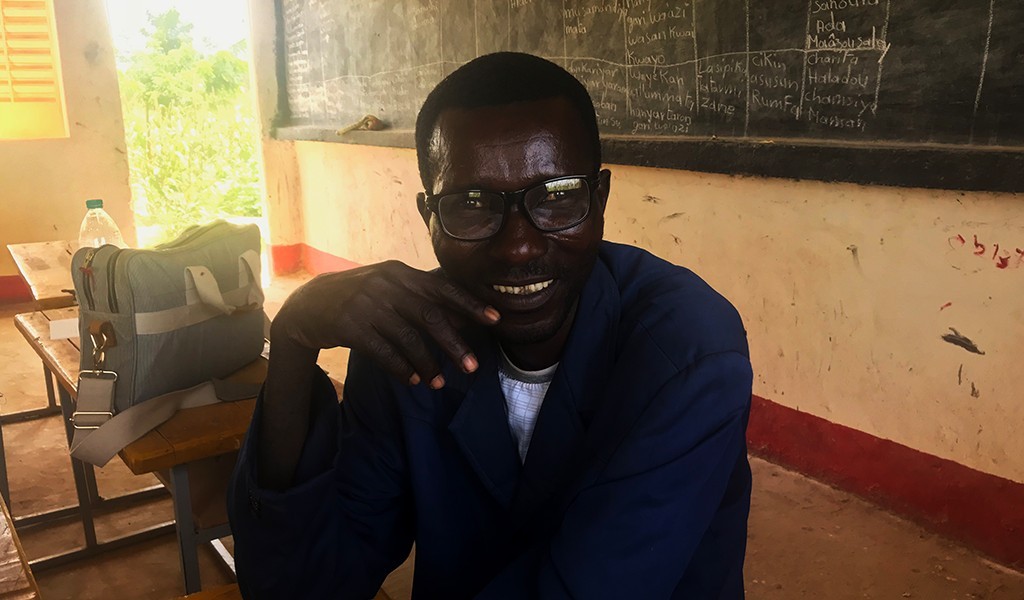
Based on the conversations with beneficiaries such as Mikou, our visiting team, assisted by UNCDF/PAM Members on the ground, began conducting human-centred immersions with rural WFP beneficiaries around Maradi, the second-largest city and economic capital of Niger. Lisa Chassin, PHB Partner and the lead consultant, said, “In order to make the shift to digital a success, we first needed to identify people’s needs and constraints in using and adopting digital financial services. These barriers hide in plain sight - but with our partner Innate Motion, we used empathy to connect with the beneficiaries, see the world from their perspective and delineate their inherent struggles, extracting significant learnings. This exercise allowed us to identify the digital capacity gaps among the WFP beneficiaries. It is these critical gaps that will be addressed through our training of trainers curriculum to be delivered in sessions with WFP's operational partners, NGOs, village leaders and other stakeholders.”
Amina Boubacar feels that WFP has eased the challenges of staying in Niger. “Life is easier now that we receive the support from the WFP. We eat better food, and more regularly; now I can afford to buy soap which impacts my skin health – before, even after the shower, I was always feeling muddy.”
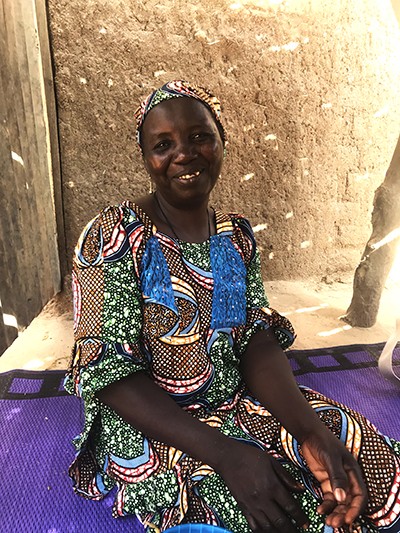
Despite the current structural challenges on the ground, such as poor connectivity, low literacy levels, low-levels of phone ownership – the WFP beneficiaries seemed excited about the possibilities of receiving their monthly disbursements via mobile money. They especially liked the discretion and the confidentiality the service provides. "Mobile money seems great! No need to get together on disbursement day, with everyone knowing that you are receiving money," said 55-year-old Amza Sha.
In order to enable cash disbursements effectively, UNCDF, WFP and the mobile money provider must ensure that the agent network is reliable and can support the WFP beneficiaries specific use-case in underserved communities. Strengthening the agent network for the digitization of cash transfers is, therefore, a critical next step – and our next mission will look specifically for ways to strengthen the deployment of agents to key sites to service WFP’s beneficiaries. So far, the findings from discussions with beneficiaries indicate that, for them, technology is a bridge to development and to the rest of the world. This project is a way to bring them closer to their aspirations of entering the “modern world” while being able to manage their finances better.
Legends:
1-Source https://www.wfp.org/countries/niger
2 – Video: WFP Resilient Agriculture Techniques in action.
If you are interested in our work, please contact me,
Lisa Chassin
PHB Partner and Head of Studies and Strategies
Photos: Dominique Tagba | Lisa Chassin
Story Contributor: Lisa Chassin
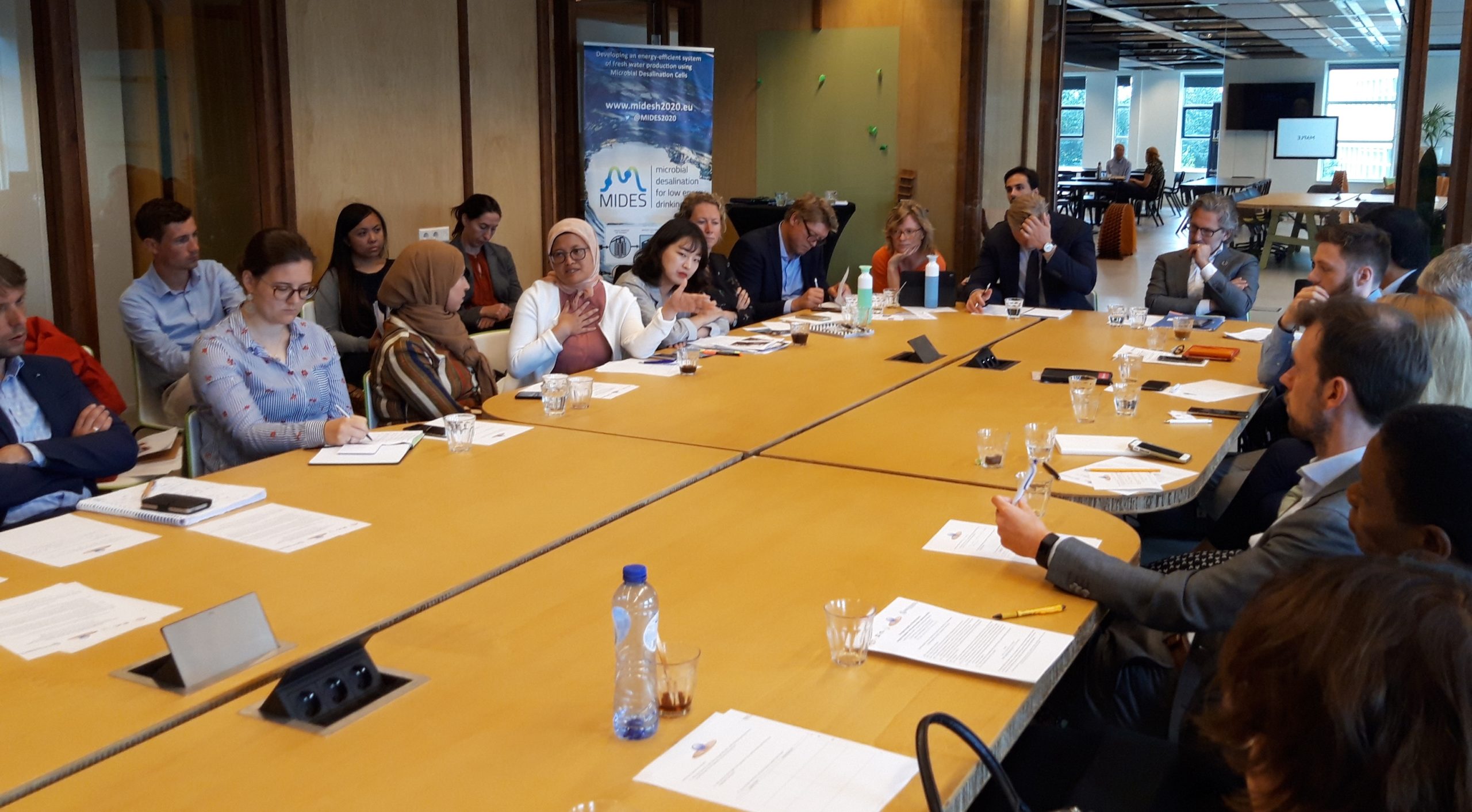
PHB Co-hosts Roundtable on Practical Adaptation to Climate Change
“Innovative Adaptation in Africa and Asia: Water, Agriculture and SDGs” was the theme of the meeting, which was held at the Humanity Hub, a rally point and working/meeting place of “doer” organizations which are “innovators in peace, justice, and humanitarian action.”
Some 30 international organizations and embassies gathered in The Hague, the Netherlands, on 5 July to brainstorm on how water resource management, agriculture and financial systems in developing countries can better respond to a changing climate. This 9th meeting of The Hague Roundtable on Climate & Security was co-hosted by PHB Development. PHB – which is expanding beyond Digital Financial Services to a range of Mobile Information Services – was met by an enthusiastic group of participants from organizations working to improve the lives of people in climate-affected regions.
“Innovative Adaptation in Africa and Asia: Water, Agriculture and SDGs” was the theme of the meeting, which was held at the Humanity Hub, a rally point and working/meeting place of “doer” organizations which are “innovators in peace, justice, and humanitarian action.”
In presentations, Vice-Rector Prof. Charlotte de Fraiture of IHE Delft Institute for Water Education highlighted initiatives on water resource management and capacity building in developing countries. Practical action based on such initiatives can help mitigate prospects of climate apartheid, in which the wealthy can isolate themselves from the impacts of climate change, while the majority are negatively affected.
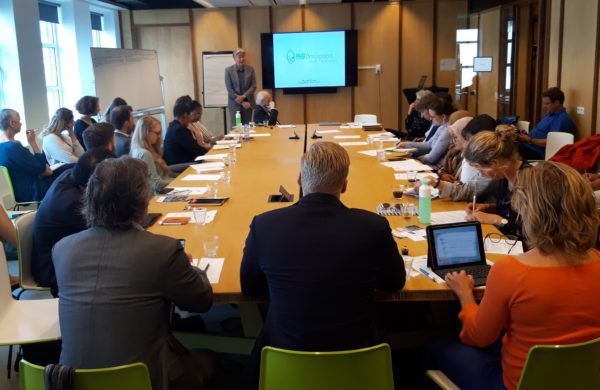
PHB partner Ronald Everts (standing in photo) presented projects in Mali and in Indonesia, where unexpected partnerships process satellite- and drone-gathered data, so it becomes accessible to smallholder herders and farmers via mobile phones. They can then locate and manage natural resources that are essential to their productivity and livelihoods.
In a highly interactive session, participants examined the presented initiatives and used their own expertise to develop recommendations. “Who owns and processes the data?” was a recurring consideration, with implications for empowerment, privacy and even land rights of low-income people. Links to the UN SDG’s was established throughout the brainstorming.
Ronald Everts: “I was impressed by the dynamic interaction with the “doers” in the room. The objective to link parties in this field was clearly a success. I was equally pleased that PHB’s chosen approach in the projects I presented struck a chord, and a good number of participants reached out for further information. I am looking forward to the follow-up.”
Contact Ronald Everts for more information and follow-up possibilities.
The Hague Roundtable on Climate & Security is an independent forum to promote international cooperation in adapting to climate risks to human well-being, sustainable development, and peace. The next Roundtable will be held on 12 September, hosted by the Embassy of Germany in The Hague: “Extreme Weather Disasters – Resilience, Forecasting and Cooperation.” Visit the Roundtable contact page to get in touch for more information.
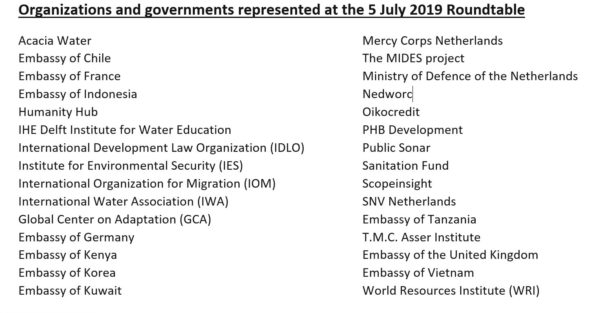
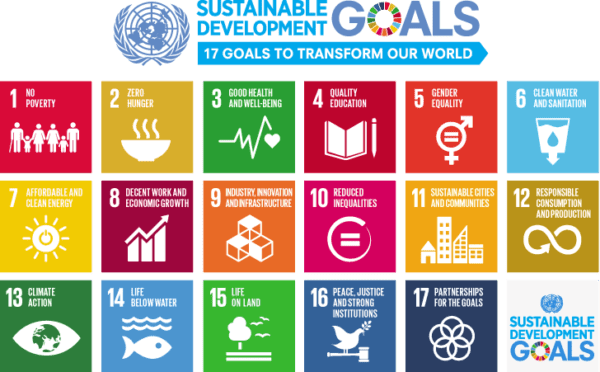
PHB working through the lens of the SDGs
The financial inclusion sector is realizing the value of applying the UN Sustainable Development Goals (SDGs) as a way to shape activities, and PHB embraces this direction. Here’s a look at a few of our activities that correspond with selected SDGs.
PHB Development is a social enterprise offering increasingly diverse services around the world: Sub-Saharan Africa, South Asia and the Pacific — and more. While financial inclusion is at the core of our business, we are expanding into agricultural value chains and financial inclusion for refugees.
The financial inclusion sector is realizing the value of applying the UN Sustainable Development Goals (SDGs) as a way to shape activities, and PHB embraces this direction. Here’s a look at a few of our activities that correspond with selected SDGs.
SDG 1 No Poverty: As of 2015, about 736 million people still lived on less than US$ 1.90 a day. (undp.org).
PHB Development has a project selection methodology to ensure we work on projects that have the highest positive impact on the livelihoods of the poor. Once allocated on these projects, we have developed tools that custom make products and services for low-income people:
- Human-centric design to meet customers’ needs and provide maximum benefit
- “Rapid prototyping” to test a new product and its features with customer input
- Value proposition mapping and business case development for the low-income segment
- Improved customer education using visual aids to support less literate customers using mobile devices
As a result, improved agriculture leases, education loans, consumer loans, and housing loans lead to wider implementation of DFS, with far-reaching impacts on the local economic cycle.
SDG 2 No Hunger: Progress involves promoting sustainable agricultural practices: supporting small scale farmers. (undp.org).
Digitizing agriculture value chains is one way of applying technology to help improve overall crop production and improve the functioning of agricultural supply systems for smallholder farmers in developing countries. PHB has been working to support efficiency in the agriculture sector through DFS. For example, in the maize value chain in Uganda – from crop production, processing, and trading, to final consumption – PHB consultants are designing digitization strategies to benefit farmers and their workers, as well as merchants and other actors in the value chain.
SDG 5 Gender Equality: Ending all forms of discrimination against women and girls is also crucial to accelerating sustainable development. (undp.org)
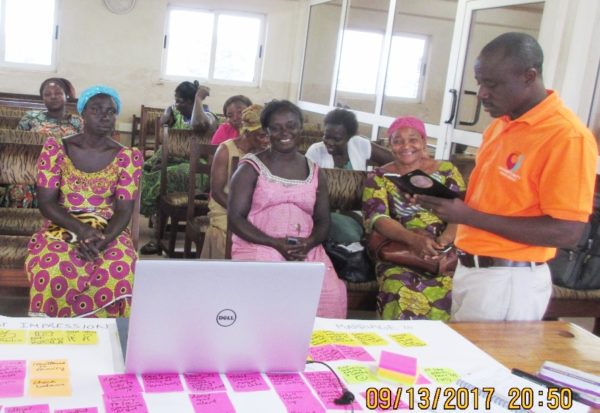
PHB has been working in Papua New Guinea with Women’s Micro-Bank Limited in a partnership with UNCDF’s Pacific Financial Inclusion Programme (PFIP). The Mama-Bank Access Points branchless banking project is bringing financial services to women in rural areas who are not able to afford the time and costs of travel to distant bank offices. And in Ghana, with support from PHB Development, Opportunity International developed a set of women-focused training materials with an emphasis on creating a safe space that welcomed questions to support customers to build digital literacy.
SDG 10 Reduced Inequalities: Facilitating the safe migration and mobility of people is one of the keys to bridging the widening divide. (undp.org)
Financial inclusion for the displaced is an area of focus for PHB, for example through our work in Ethiopia with the Ministry of Finance and the World Bank in the Productive Safety Net Program, that enabled social transfers through digital services. PHB has also worked with CGAP and GIZ Jordan to provide DFS for Syrian refugees in Jordan, by implementing a secure method of transfer remittances.
Be sure to listen to our podcast Episode 2 on GIZ and inclusion for refugees in Jordan!
PHB is increasing efforts to ensure that SDG impact in interwoven in all our activities. From project selection to project execution, we believe in the importance of this approach for social impact. We will provide updates on our progress, as communication of work on SDGs is also important to help increase synergies in the global community.
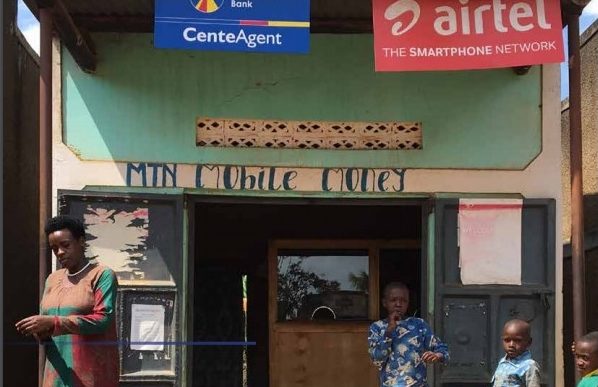
Report: Supporting a ‘New Channel’ of Agency Banking in Uganda for UNCDF
It was a pretty big deal when UNCDF partnered with five banks in Uganda to design and roll out agency banking throughout the country of some 43 million people.
It was a pretty big deal when UNCDF partnered with five banks in Uganda to design and roll out agency banking throughout the country of some 43 million people. With mobile money services active since 2009, the banks were eager to engage in branchless banking activities, pending the issuing of regulation from Bank of Uganda in 2017.
As a result, agency banking is now becoming business-as-usual in many areas there – thanks to the success of this UNCDF project. PHB has been honored to contribute its consulting expertise to the strategy and design, the development and implementation of the pilot project, and then to the publication of the final report on this large undertaking.
The release of the report in February 2019, “Introducing Agency Banking in Uganda: A New Channel to Increase Financial Inclusion,” details expertise applied and learned in supporting the roll-out of agency banking from September 2016 to July 2018. “There are now hundreds of thousands of clients able to access the five partnering banks’ services remotely, through thousands of agents spread across the country,” said Ciprian Panturu, a partner of PHB Development who was embedded in the UNCDF project to manage the pilot and supervise technical assistance to participating banks. “PHB has worked with UNCDF in projects around the world, either by providing technical assistance to its partners or by managing projects. I’m glad they trusted our expertise once again – especially here in fast-paced Uganda – to help achieve the intended results.”
And, it should be mentioned that Ciprian is also lead author of the UNCDF report!
Results of the pilot were largely successful compared to similar initiatives in other countries. Factors in the success include application of previous experience in designing such a multi-stakeholder pilot, national conducive context, and there was a clearly identified need for such an alternative delivery channel from the financial institutions.
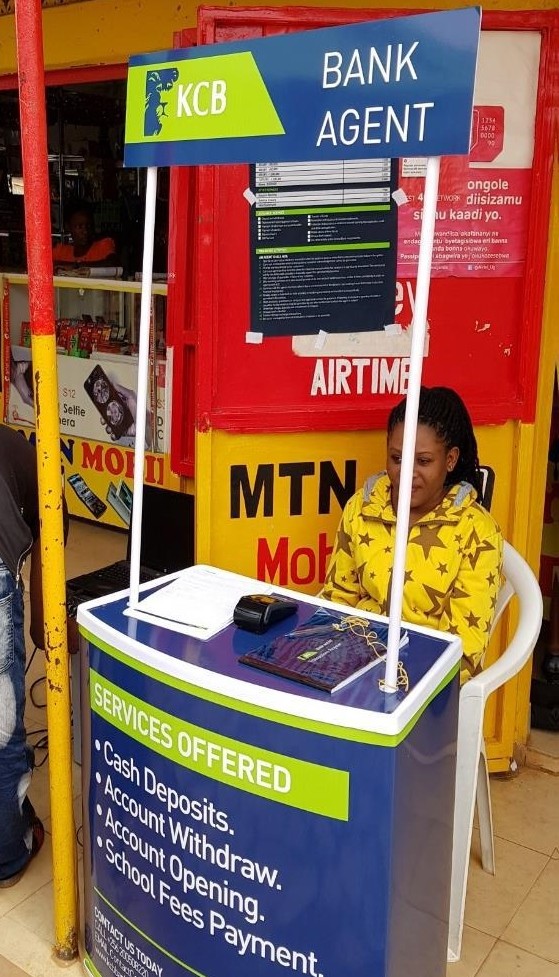
“We applied a combination of internal and external learning within the project: what we assumed during the design had been thoroughly tested and proven throughout the implementation of the pilots, and then adjusted to maintain a cohesive logic of the channel within the banks’ ecosystems” said Ciprian, “It was crucial to ensure that the banks had a head start with expertise accumulated through similar implementations, and hands-on support that they needed for this to be a success – and I believe this was delivered.”
Some of the key findings and confirmations from the Uganda Agency Banking report include:
Banks
- Agency banking is a complex channel to build, and banks should approach such transitions as aClients can now access banks’ services through agents around the country.
reshaping of their general strategies – with a human-centric design.
- Rolling out agency banking requires a sustained, flexible and proactive approach – along with regular operations. Banks needed to provide sound systems carrying relevant services, to monitor agents and their operators, as well as acquire, educate and retain customers. It is also important to understand that change takes time, and real proof of value comes only through verifiable results.
Agents
- Banks identified rural schools and savings and credit cooperatives (SACCOs) as ideal agents to start with, ensuring transaction volumes in addition to sufficient liquidity to handle them.
- Waiting times in agent onboarding may decrease motivation, and agency banking regulations requiring Bank of Uganda approval for each agent, as well as proof of having a regulated account for a minimum of 6 months, can make agent selection difficult in rural areas.
Customers
- Payments for goods, services, utilities and school fees attract early adopters – who also seek to avoid transportation costs and travel time. Established value chains should also be explored to increase adoption by new customer segments.
- Fewer women initially adopt the channel, but when they do, they make regular transactions. For example, female customers represented only about 20 percent of all customers at one bank, but 94 percent were active. In contrast, only about 56 per cent of its male customers were active.
The complete report “Introducing Agency Banking in Uganda: A New Channel to Increase Financial Inclusion” can be downloaded at the following URL (PDF). https://www.uncdf.org/article/4381/agency-banking-in-uganda-a-new-channel-to-increase-financial-inclusion
PHB’s track record of providing expert consultation for UNCDF includes the launch of digital financial services in Lao PDR over a four year period from 2014-2018. In Laos, PHB worked with a wide network of stakeholders for an extended period to help build the DFS ecosystem from the ground up. PHB also helped support a digital payment system with UNCDF from 2016 – 2018 in Benin for the Zem moto-taxi drivers and their passengers, thus increasing financial inclusion for essential service providers in the cities.
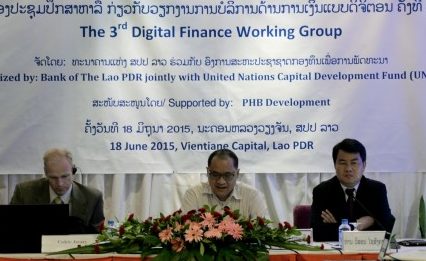
The Emergence of Digital Financial Services in Lao PDR
PHB Development has worked in close consort over the past four years with UNCDF* to develop a Digital Financial Services (DFS) ecosystem in what was previously a greenfield environment for digital payments.
Lao PDR is taking steps to digitize its economy, as are all other ASEAN countries. PHB Development has worked in close consort over the past four years with UNCDF* to develop a Digital Financial Services (DFS) ecosystem in what was previously a greenfield environment for digital payments. Today there are tens of thousands of new DFS users, representing nearly 1% of the adult population who are regular users of DFS. Though the numbers are relatively modest, they are significant tailwinds in this growing success story.
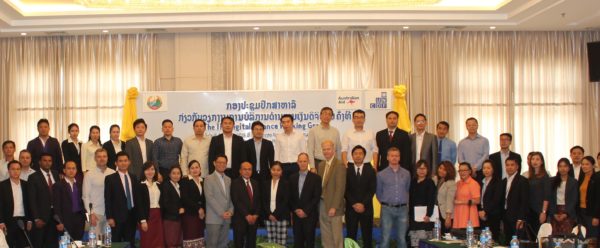
The Digital Finance Working Group was convened each quarter under the chairmanship of BOL as a forum for the DFS industry to address opportunities and challenges related to DFS.
When PHB first engaged in Lao PDR in September 2014, nearby Cambodia already had providers like WING with 1.5 million mobile money subscribers. Meanwhile, in Lao PDR, there were no institutions offering DFS or branchless banking – and therefore no customers. This was partly because the Bank of the Lao PDR (BoL) had no regulatory framework for this burgeoning industry.
Digital Financial Services Ecosystem
Through PHB’s work within UNCDF and with BoL – across a wide network of stakeholders for an extended period – PHB was able to help catalyze the development of the DFS ecosystem from the ground up. As of October 2018, there were multiple bank-led DFS initiatives underway, and the largest mobile operator had launched the first-ever pilot of a mobile wallet under the authority of the Bank of the Lao PDR.
The four-year journey was led locally in Lao PDR by UNCDF under the directorship of the central bank, BoL “Businesses have increased confidence to make investments in the Fintech market here, and that is a big change. The work of all of these partners has created the opportunity for services like mobile money wallets, branchless banking, digital microfinance and QR code-enabled merchant payments to begin to flourish,” said David Kleiman, a PHB Senior Consultant, and UNCDF DFS Consultant in Lao PDR from 2014-2018.
This ecosystem development grew across multiple dimensions including financial institutions, and new payment service providers, with BoL as the regulator. PHB supported early market entrants including BCEL** and Unitel to develop business plans while advising BoL on establishing suitable and enabling digital policies. This approach ultimately supported the introduction of the first-ever DFS services in Lao PDR, including:
- BCEL’s Community Money Express (BCOME): now in their second phase initiative for branchless banking which includes account opening with an instant issue ATM card and the ability to make P2G payments for road tax – as well as other standard branchless banking services. These innovations were supported through PHB Development’s team over a period of more than 18 months through all phases of preparation, testing, training, pilot and launch. See the multi-media case study “The Dawn of Digital Finance in Lao PDR.”
- Unitel, the largest Mobile Network Operator (MNO) in Laos, and part of the Viettel Group was supported by PHB to establish Star FinTech Co Ltd (SFT) to meet compliance obligations of BoL and develop the most suitable DFS service for the Lao PDR population. PHB conducted research applying the principles of Human Centered Design to support the creation of branding and the development of the U-money mobile wallet. SFT received approval to launch a commercial pilot of U-Money in September 2018.
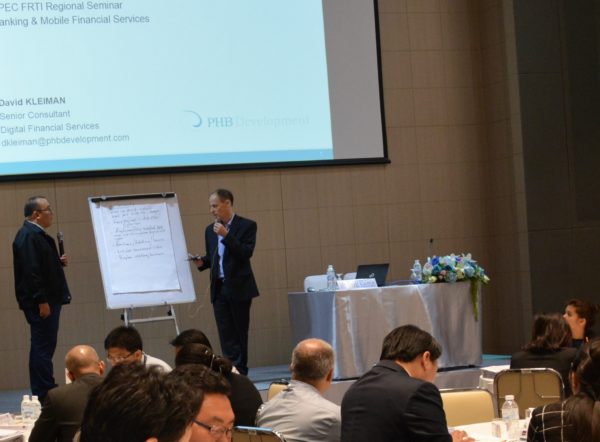
David Kleiman (standing, right) facilitating a session at the ADB Financial Regulatory Training for Mobile Financial Services, attended by BoL and 15 other regional central banks – hosted by the Bank of Thailand.
The establishment of the BoL Payment Systems Department in early 2018 presented another opportunity for PHB to support UNCDF in developing training on the principles of DFS for the new department. This training helped department staff get up to speed on DFS topics and supervisory approaches to e-money, agents, and customer protection – resulting in better understanding and interpretation of the recently enacted National Payment Systems Law.
“The actors all needed an on-site resource person, someone who could be called upon by any stakeholder – UNCDF and its partners, the Bank of the Lao PDR and wider stakeholders such as other banks, MFIs, MNOs or Fintechs – as a neutral advisor to address specific questions associated with the rapidly changing DFS climate. As the UNCDF DFS Expert, my role was to bring together stakeholders on digital implementation and strategy issues,” said David, “The results really speak to the ambition of BoL and tenacity of the UNCDF. Although there was no clear concept of regulation for DFS when PHB arrived, now there is a national payment system law; a department within BoL to implement it; providers offering appropriate services and most importantly…customers.”
“A lot of learning took place through workshops and training that can lead to further positive development. We are seeing a growing set of use cases beyond simply remittances, and that points to further adoption of DFS in the country,” said David.
*PHB worked directly with UNCDF’s global initiative known as MM4P, and the Lao PDR national implementation program MAFIPP (Making Access to Finance Inclusive for Poor People)
**Banque Pour Le Commerce Extérieur Lao Public, the largest bank in Lao PDR
(More on PHB training)
Featured PHB-facilitated workshops during this period:
• Building Effective Agent
Networks: Training and exposure workshop for banks and non-banks to
understand how to scout, select, recruit and manage agents for DFS.
• Digital Finance and Interventions Models for MFIs:
Support to MFIs interested in the digitalization of their business and
introduction of DFS. Based partially upon the models discussed in the 6-part Toolkit Series “How to Succeed in Your Digital
Journey,” a series of practical guides for financial
service providers from PHB Academy, UNCDF MicroLead and the MasterCard
Foundation on DFS.
• Asian Development Bank Financial Regulatory Training Initiative (co-facilitated
by PHB in Bangkok): Supported three representatives from BoL to attend this ADB
training program with regulators from 16 other countries on Electronic Banking
and Mobile Financial Services.
• National Payment Systems Act as applied to Digital Financial
Services and Financial Inclusion: Training for 13 technical
staff of the newly formed Payment Systems Department (PSD), and focused on
understanding aspects of the National Payment Systems Law (NPS) as as related
to DFS and the department’s role in inspection, strategy, audit, policy and IT
policy.
• AML/CFT Principles for Digital Finance Providers: Training
workshop – followed by individual coaching with two providers – about the
compliance requirements under the AML law and risk mitigation strategies.
A previous PHB blog on DFS development in Lao PDR was published in June 2017

Agriculture and displacement: PHB at UN Climate Conference
PHB is taking part in COP24 in Katowice, Poland, to highlight initiatives to support the adaptation of agriculture and financial inclusion for displaced persons.
PHB is taking part in COP24 in Katowice, Poland, to highlight initiatives to support the adaptation of agriculture and financial inclusion for displaced persons. Dialogue at this year’s UN Climate Conference has focused more on working together for adaptation so that communities can be more resilient while working on the entire climate change issue.
Side events at the COP around the Sustainable Development Goals (SDGs) have included addressing needs of the displaced, food security and agriculture, peacebuilding, gender inclusion, renewable energy and much more. PHB has been represented during the second week of these events to explore areas of potential cooperation in working toward the SDGs, especially in developing countries of Africa and Asia.
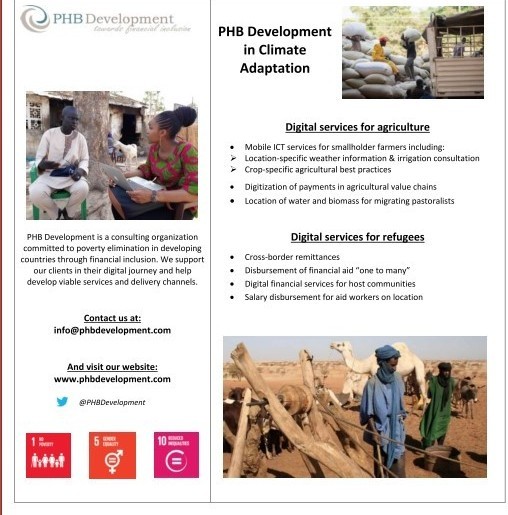
COP24 will run through Friday 14 December, as negotiators from some 190 countries seek agreement on guidelines for implementing the Paris Agreement. Get in touch with PHB to find out more about how we are working on future-focused programs in agriculture value chains and financial inclusion for displaced and host communities. Cooperation is the key to sustainable and stable societies.

PHB in digital adaptation to climate change
Adaptation of agriculture to changing climate patterns and potential increases in refugees will be among topics discussed at the 8th meeting of The Hague Roundtable on Climate & Security on 4 December.
Adaptation of agriculture to changing climate patterns and potential increases in refugees will be among topics discussed at the 8th meeting of The Hague Roundtable on Climate & Security on 4 December. More than 50 participants from 30 embassies and 12 organizations are expected meet to share strategies on climate adaptation at the event that will be hosted by the Embassy of Vietnam in The Hague.
Digital Financial Services (DFS) are offering an increased range of capabilities in assisting farmers with weather and agricultural applications, as well as enabling a growing number of refugees to become more financially independent. PHB will be a part of the conversation at the Roundtable to share these kinds of trends that can help people in areas that are experiencing more severe climate change impacts.
PHB has given technical assistance to the digitization of payments for projects in agriculture value chains in Uganda: tea, coffee, maize, dairy and soybeans. The result has been available digital services that can help streamline production processes and capabilities in changing conditions. There has also been progress with initiatives such as the Sustainable Technology Adaptation for Mali’s Pastoralists (STAMP) program in Mali to provide farmers and pastoralists with target information on resources – with an aim of meeting needs more easily and reducing the potential conflict over these sources of livelihoods.
Providing financial services to refugees is receiving increased attention at forums such as the European Microfinance Week (EMW) that was held last month in Luxembourg by the European Microfinance Platform. From the delegation of three PHB consultants attended the conference, Alexa Sanchez moderated a panel session on Advancing access to financial services for refugees: Digital solutions to expand access and lower costs. And the EMW 2019 conference will be centered around Microfinance in Adaptation to Climate Change.
Keep a watch on the PHB website for a podcast interview about the refugee panel, and for more soon on PHB’s participation at the EMW 2018. There will also be a report published on the upcoming Roundtable at the Embassy of Vietnam.
About the Roundtable: The Hague Roundtable on Climate & Security is an independent forum to promote international cooperation in adapting to climate risks to human well-being, sustainable development, peace and political stability. Created in 2015, participants from representatives of governments and organizations meet for informal conversations to share information and strategies in adaptation regarding water resources, natural disasters, floods, droughts, sea level rise, migration, potential conflict and stability of fragile states. PHB communication consultant Matt Luna is the creator and organizer of the Roundtable initiative.
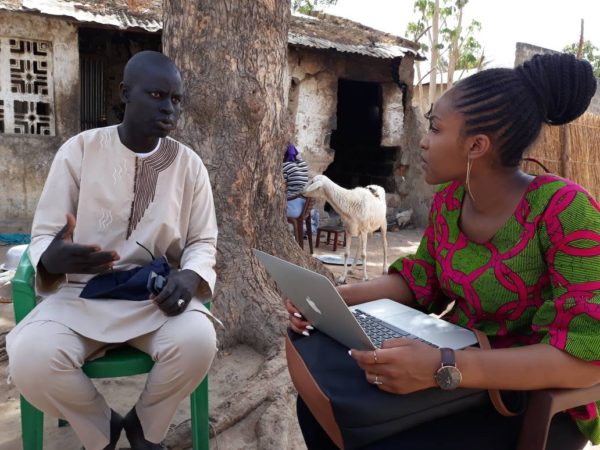
A path-in-progress toward financial inclusion
Ruth Thiemele-Kadjo shares highlight of her professional path so far, and what motivates her work on financial inclusion initiatives in this interview ofa Mobile Money agent in rural Senegal.
Interview with PHB Consultant Ruth Thiemele-Kadjo
Ruth Thiemele-Kadjo is a consultant with PHB Development with a current focus on DFS strategy, agent research and regulation in West African countries. Born and raised in Dakar, Senegal, Ruth built her initial financial services experience through hands-on work including with the African Microfinance Transparency Association as she completed her Bachelors in Finance at Bordeaux Ecole de Management in Dakar. She was happy to share highlights of her professional path so far, and what motivates her work on financial inclusion initiatives.
What is your core motivation?
In Senegal, you can see a big difference in the rich and poor. There has always been a big gap, and I asked myself how can I contribute to economic development in Africa and the quality of life for the people?
I discovered PHB in Fall 2016, and I joined as a part-time consultant. With my previous experience in microfinance and development, it has turned out to be a good match to learn about digital tools in a sector that I was already familiar with. Seeing the actual results of digital financial services in the field is more than fascinating. With PHB, there is always something new – whether it’s new technical applications or regulations.
Can you describe your work with PHB?
The Agent Network Research project in Senegal was my first mission in rural areas. We interviewed Mobile Money agents that were deployed with the Mobile Money for the Poor program (MM4P) by UNCDF. We were applying a Human-Centric Design approach to identify their main difficulties and in what conditions they were working. We took their entire situation into account – financial and personal.
It was hard for them to do their work because of Internet connection problems, so much that some agents gave up and quit. They also had liquidity issues, often requiring travel to larger cities to try to solve. I met one agent in a village where many people could not pay their hospital bills, because they would need to travel to cities to receive money from relatives and friends. He wanted to help people in village clinics have access to money for their medical bills. The mission is still going and we’re looking forward to more to report.
Another highlight was the Digital Services Workshop in Dakar, Senegal, that was facilitated by PHB and sponsored my MM4P. Digital loans and savings are something relatively new there. We shared examples from East Africa where DFS is more developed and discussed challenges of partnerships to develop a DFS project in West African countries.
We saw the knowledge base being built through our efforts! I think the discussions on DFS implementation with participants from different types of institutions were enlightening. It all comes together to develop DFS.
I was also fortunate to work on training-of-trainers for a digital money project pilot for moto-taxi drivers in Benin. What a great experience! I am looking forward to being a central part of future PHB missions, especially as I am a francophone, and there are more opportunities for development in West Africa.
How did you get your start in the financial inclusion sector?
My first internship was with African Microfinance Transparency in Dakar, a project developed by ADA Luxembourg which helps connect microfinance institutions in Africa. We developed capacity-building programs and produced events in Dakar for a platform for people to meet and share their experiences. This was my first microfinance experience, I found it inspiring and then looked ahead in this direction.
Maybe it was a fortunate coincidence AMT office was in the same building with MIX Market, which is a platform that provides access to data in the financial inclusion sector. So I went on to work at MIX first as a financial analyst intern, then as a part-time financial analyst associate. It opened my eyes to how microfinance worked. I saw how hard it was for small MFIs in some countries because of financial and regulatory issues. Reflecting upon the experience, you could say that I challenged myself to see what more could be done for these MFIs. My research and follow-up work eventually led me to France to pursue my Master's degree in risk management, which was a spark toward a new direction that I did not really expect.
I began working with Positive Planet in reviewing calls for proposals and analyzing offers in comparison to our value propositions. This could be called my first “real” experience in the development sector, and I knew right away that I wanted to go to the field. It’s been an interesting path that’s taken me to work with PHB!
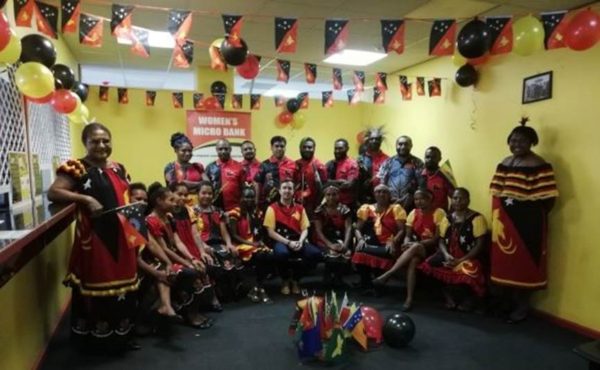
Mama-Bank Access Points in rural Papua New Guinea
The MAP initiative is a pilot from Women’s Micro-Bank Limited (WMBL) through a partnership with UNCDF’s Pacific Financial Inclusion Programme (PFIP).
Mama-Bank Access Points (MAPs) branchless banking solution
PHB is proud to be a part of a new technology-based program that is bringing financial services to women in rural areas of Papua New Guinea (PNG), even offline. The Mama-Bank Access Points (MAPs) branchless banking solution is being piloted at six locations in Papua New Guinea with the aim of providing basic financial services to PNG’s unbanked women.
Pic: The WMB team ready to propel the MAP agenda
The MAP initiative is a pilot from Women’s Micro-Bank Limited (WMBL) through a partnership with UNCDF’s Pacific Financial Inclusion Programme (PFIP). The project aims to reach out to existing and potential new women clients of WMBL in rural areas, who are currently not able to access basic financial services due to the time and costs associated with travel to distant bank offices. There are also cost and logistic challenges to the establishment of brick and mortar branches in most provinces, further complicating some situations.
PHB Development is working with WMBL and PFIP to support system development based on human-centric design (HCD), which helps ensure actual benefits for the users, and that it is accessible within their routines. Grace Akinyi is a PHB consultant on the project: “What I’ve seen is that women are still marginalized in some areas of PNG, so they try to make a living by selling wares in the streets. We want to help improve their livelihoods by extending access to financial services in their communities. It’s the first of its kind there, and it’s a solution to a real need.”
The 13-month pilot began in March 2018, and is part of the PFIP, a Pacific-wide program that helps low-income Pacific islanders obtain access to financial services and financial education, often through innovation with financial services and delivery channels. “Mama-Bank Access Points will help the women in rural and also urban areas. Some accounts they have are not active, and this will help with a more direct and interactive presence,” said Grace.
Gunanidhi Das, General Manager of WMBL, said, ”The only solution to provide banking services for unbanked rural clients and inculcate savings culture among them is to have a technology-enabled robust solution near to their locations. The MAP project, sponsored by PFIP and supported technically by PHB Development, is the way forward to accomplish this mission and bring success to women of PNG as well as to WMBL. We are very much thankful to PFIP and PHB for their support.”
And looking ahead, Grace added, “The MAPs can be taken to other provinces so that women can do more – and help themselves. People are positive about the initiative, and even excited to see it bringing the services out to those who previously had no access.”
PFIP is jointly administered by the United Nations Capital Development Fund (UNCDF) and the United Nations Development Programme (UNDP) and receives funding from Australia, New Zealand and the European Union.
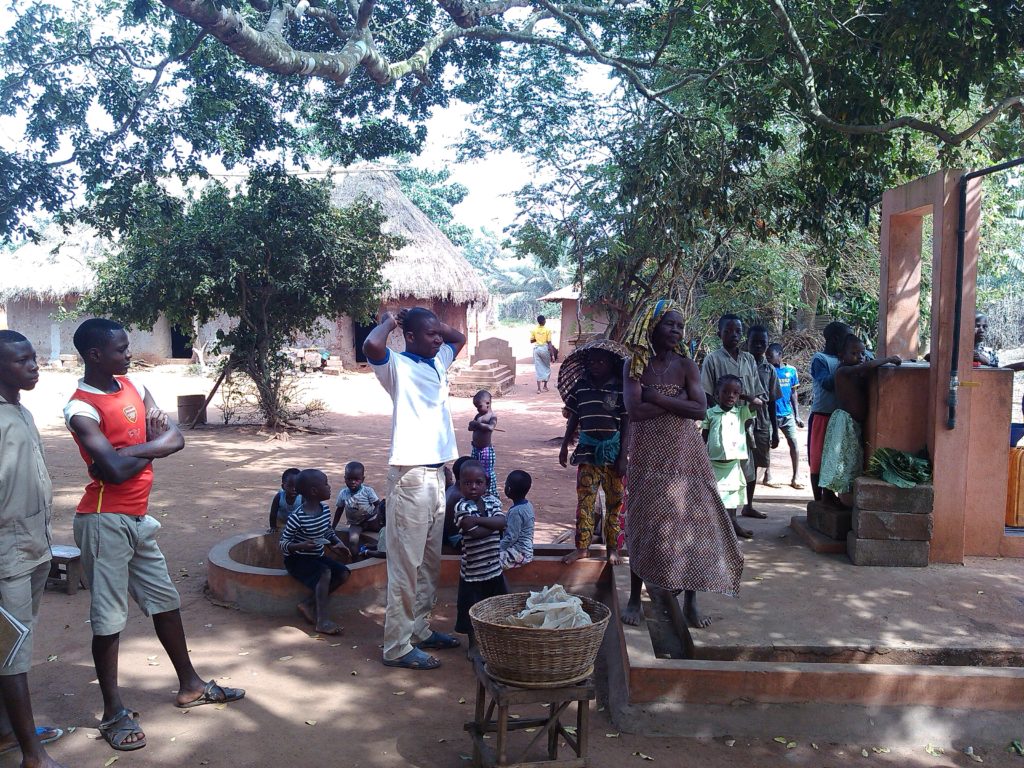
The mWater story through photos: Water accessibility with DFS+
How can digital finance assist the poor in attaining basic necessities? DFS+ is a term for digital financial services that enable the poor to have better access to basic utilities of life including health services, water and education.
How can digital finance assist the poor in attaining basic necessities? DFS+ is a term for digital financial services that enable the poor to have better access to basic utilities of life including health services, water and education. mWater is one such service that provides digital solutions to help find better access to clean water.
PHB would like to share some powerful photos of the daily struggles to access clean water in Benin. It is hoped that these photos demonstrate the need and amount of effort for the poor to access water.
mWater is a project of Manobi, Mobile for Development, that serves 150 water systems in Benin. The “Services to Improve Rural Water Service Performance in Benin” project links administrators, operators, managers, inventory agents and households to make water resources more accessible for the poor. PHB Development assisted GSMA and Manobi in various data and linkage aspects of this project.
Philippe Breul and Jean Pouit of PHB trained data collection agents in the field to gather data for a baseline survey to be supervised by GSMA. After meeting stakeholders including the World Bank, the PHB team met mobile network operators (MTN, Moov), CePEPE, and banks before field visits in the Sakété and Zogbodomey regions in December 2015. The goal was to better understand the mWater ecosystem: operators, final users, and mobile agents. After training data-collection agents for each region, a questionnaire was finalized to feed the baseline survey, and then validated by GSMA in 2016. Furthermore, PHB along with the other supporting organizations of the project helped establish links with mobile money agents for the payment of water usage.
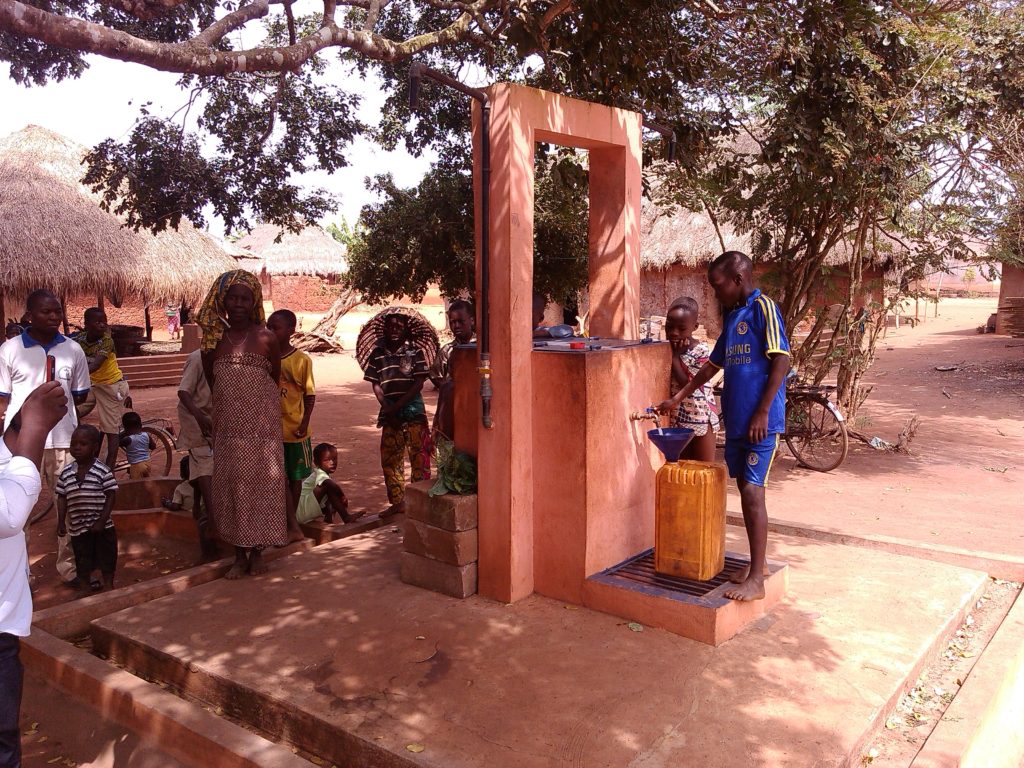
Manobi converging solutions (Mobile 2 Internet) are optimizing the performance of this industry. They are exploited in rural and urban locations in several areas:
- Participatory management of the infrastructure of access to water
- Maintenance of rural networks of water access
- Curative and preventive maintenance of water supply in an urban area
- Regulation of operations and maintenance
- Mapped inventory and inspection of water networks
For more information on the project, please contact Jean Pouit at jpouit@phbdevelpment.com.
Contribution: Jean Pouit
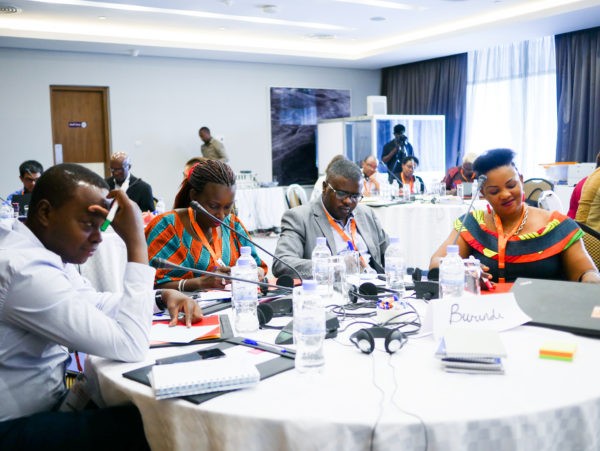
PHB Academy: Translating lessons into action
What did we learn? How did we learn? What do we do now? These were the central questions of the final learning event that PHB Academy facilitated for CARE POWER Africa.
Final Learning Event for CARE POWER Africa
24-26 April 2018, Kigali, Rwanda
What did we learn? How did we learn? What do we do now? These were the central questions of the final learning event that PHB Academy facilitated for CARE POWER Africa, a 5-year project to promote Village Savings and Loans Associations (VSLAs). PHB Academy’s Pete Sparreboom (below in the photo, standing) designed the event in close collaboration with the project’s regional team and used her expertise in process facilitation to help project staff find answers.
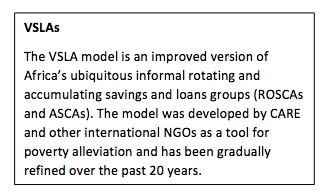
Financial services for the poorest
POWER Africa, implemented by CARE International between 2014 and 2018 with the support of the Mastercard Foundation, helped 750,000 food-insecure households in Burundi, Ethiopia, Cote d’Ivoire and Rwanda increase their financial literacy, develop income-generating activities, get access to formal financial services, and reduce gender gaps through VSLAs (see left for more details).
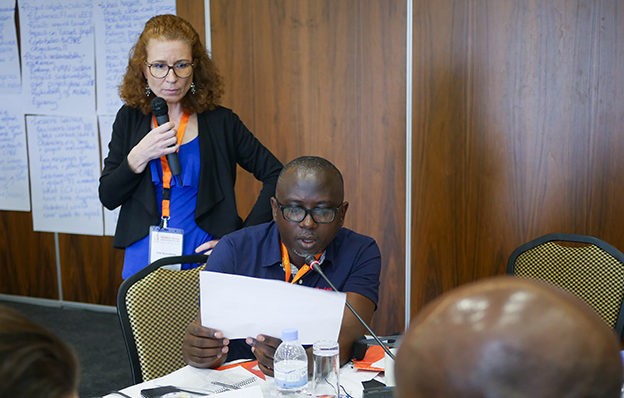
Ms Silvia Grande, CARE Canada’s Senior Advisor Monitoring, Evaluation and Learning said, “The workshop was aimed first of all at better understanding what POWER Africa had accomplished, and what lessons had been learned in the process.”
Lessons learned
The point of this end-of-project workshop was not to train project staff on the basis of VSLAs – after all, they were the experts! Instead, the purpose was to help them draw more advanced lessons from their experience, document these lessons, and use them in the design of new projects as well as personal action plans.
Some of the project activities and lessons learned that were discussed during the event:
- Efficient models for bringing VSLAs to scale: Instead of engaging with local NGOs, it may be better to engage individual members as Village Agents and support the development of an independent Village Agent Network (Rwanda and Burundi).
- Linking VSLA members to formal financial service providers: While banks and mobile network operators may initially hesitate to develop appropriate products for VSLAs, once they see the business case they will invest (Rwanda and Cote d’Ivoire).
- Decreasing gender gaps through VSLAs: Groups of girls-only adolescents can result in jealousy, and in violence by boys; engaging “male role models” in awareness-raising can help overcome that problem (Burundi and Cote d’Ivoire).
- VSLAs as a source of resilience: Access to savings, credit and advice from peers through VSLAs can help members cope with climate change and drought without selling livestock (Ethiopia), and with political instability (Burundi).
Investment in knowledge generation
One of the reasons why the project achieved much more than it initially set out to do is that the Mastercard Foundation made available a budget for monitoring, evaluation and learning that was much larger than usual in projects of this nature. It also encouraged staff to submit evidence-based proposals for changes to activities and budgets and approved many. Ms Silvia Grande said, “PHB helped us see how we had applied action learning in the different countries, and how we could apply action learning even better in the future.”
The value of facilitated peer learning
Ms Grande continued, “We were happy to have an external facilitator like Pete to structure our experience and help us realise how we could carry forward our learning. Besides, her technical knowledge of financial inclusion and VSLAs was very useful, with good examples to share from experience.”
Pete Sparreboom, in turn, was pleased to be able to assist CARE staff in strengthening their skills in participatory action learning and adaptive management, in translating lessons into concrete projects and action plans, and in embedding continuous learning and improvement even deeper into CARE’s practice.
For more information about the CARE POWER Africa project, visit: https://care.ca/power-africa
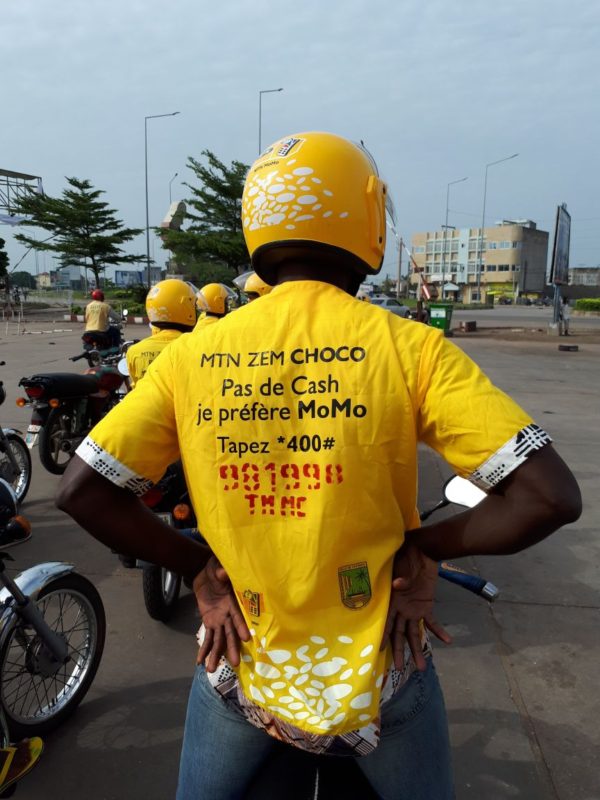
PHB supporting MTN Benin in digital payment solutions for moto-taxi drivers
They buzz past in Benin’s largest city of Cotonou, bypassing congested traffic and going off-road when needed to deliver customers to their destinations.
They buzz past in Benin’s largest city of Cotonou, bypassing congested traffic and going off-road when needed to deliver customers to their destinations. The “Zemidjan”, or better known as the “Zem”, is the motorbike taxi drivers hustling daily to make a living and facing challenges in building their status as business people in Benin society.
Along with UNCDF MM4P, PHB Development is supporting MTN Benin to develop a digital payment ecosystem for the Zem and their passengers. The project is seen as a way to increase financial inclusion for those providing some essential services in the cities.
Building the digital ecosystem around the Zems has been a sustained project encompassing several phases, as reported in a May 2018 article from UNCDF. Actions began with human-centric research by PHB and Innate Motion in 2016 to better understand the Zem’s aspirations and challenges, and investigate how they can become MTN Mobile Money (MoMo) ambassadors. “Our research helped us uncover that Zem is full of aspirations and projects for their future, but are impeded by societal and financial hassles. Involving MTN all along in this journey, we tried to understand how their lives could be impacted with digital payments – with consideration of their current challenges and longer-term ambitions. This is essential in designing a good value proposition for them,” said Victorin Salifou, DFS Expert at PHB Development
Following the research phase, PHB Development and Innate Motion worked with MTN and MM4P in developing and piloting digital payment solutions and tailored incentive mechanisms to make digital payments attractive to the Zemidjans and their customers. Digital payments are also intended to grow with the Zem being able to use their mobile money to conduct transactions for themselves, such as purchasing fuel and meals while working. With a pilot running until the end of 2018, MTN Benin intends to position the initial 200 Zem pilot participants – out of an estimated 100,000 in the city – as MoMo ambassadors to spur the growth of the digital payment ecosystem throughout the country.
Immediate benefits of digital payments include increased security, because drivers carry large amounts of cash that can be lost or stolen, especially near the end of their working day. There are also physical security and image perceptions of the Zem that could be improved: The Zem have received training on driving codes and encouragement to adhere to a dress code. “We designed a t-shirt for them that is more visible to other motorists and conveys a better image to customers. We also provided helmets they can use. We’re increasing their safety on different levels and helping to boost their image. It’s a positive step that we can build on within the project,” said Hermann Ahouandjinou, Manager – FS Sales & Ecosystem with MTN Benin.
The Zem participants needed to have a mobile money account to participate and were recruited through an association that previously worked with them. So far, 163 of the initial 200 participants have fully completed their profile to accept payment from a client via mobile money. Technologies such as Near-field communication (NFC), Unstructured Supplementary Service Data (USSD) and QR codes are helping build the digital payment ecosystem from the ground up. An MTN field team visits the Zems at points where they meet during the day, in order to gain practical information on what needs to be improved in the process to drive to the adoption. It’s a modest start with much room to grow as momentum builds.
After the pilot and the learnings gained from it, there will be the project roll-out and possible expansion to other cities. “We know that digital payments have been difficult to crack in other markets, so we want to learn from this pilot which incentives are working and which are not, to perfect our value proposition,” said Victorin Salifou with PHB.
Author: Matt Luna, PHB Development
Contribution by Lisa Chassin, Head of PHB Studies and Strategies & HCD Expert for Financial Inclusion
31 July 2018
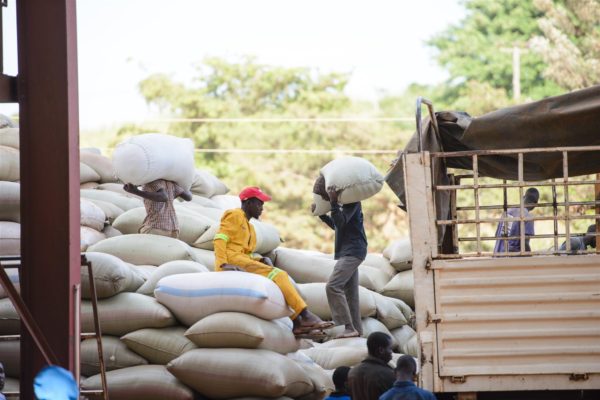
The journey toward digitalization for maize farmers in Uganda
“Digital operations are more efficient for multiple parties over greater distances, and cash-less transfers at the trader level enable more timely delivery of payments to farmers.
PHB Development has been working for a number of years to support efficiency in the agriculture sector through the implementation of Digital Financial Services (DFS). For example, in the maize value chain in Uganda – from crop production, processing, and trading, to final consumption – PHB consultants are designing digitization strategies to benefit farmers and their workers, as well as merchants and other actors in the value chain.
“Digital operations are more efficient for multiple parties over greater distances, and cash-less transfers at the trader level enable more timely delivery of payments to farmers. This also stimulates the growth of the mobile money ecosystem among smallholder farmers,” said Stephen Waiswa, a Value Chain and DFS Consultant with UNCDF. Digitization initiatives in agriculture are taking place in Uganda as part of the High Volume Payments Projects supported by UNCDF.
Agroways is a grain management company in Uganda that is responsible for processing, storing and trading maize in local and regional markets. Agroways engaged the MobiPay service provider in 2017 for the digital implementation of its supply chain. “Building and consolidating basic mobile money structures like agent networks, and liquidity management help enable digitization, and it’s important to take into account the needs of farmers in order to build a sustainable system of conducting business,” added Mr Waiswa.
PHB carried out research on the maize value chain in Uganda on introducing an agriculture management information systems system to the farmers. Goals of Agroways through working with MobiPay were taken into account in the research:
a) Work directly with farmers to sustainably grow yields, helping to guarantee maize supply with better linkage on the source of materials to supply processing plants
b) Improve livelihoods within its farmer groups through improved access to financial services, products and channels – and establish better partnerships with farmer groups
c) Improve payment transfer efficiency within the organizations and supply chain
d) Strengthen the maize value chain ecosystem through digital payment systems
Agroways established a digital platform through MobiPay, and a financial inclusion team supported in digitizing processes. MobiPay also brought farmers on board in the new system and provided training in the use of mobile money. With this digital foundation, a network of agents and merchants was created to streamline the supply chain. In the implementation phase, digital bulk payments were promoted for the farmers with Mobile Network Operators to acquire commitments in the marketing and branding resources.
Through the introduction of these digital services, Agroways aims to transform some older and less-efficient ways of conducting agri-business, as it is a prominent provider of maize-based ingredients in Uganda. During the various stages of the project implementation, a number of corrective initiatives were taken to address some of the key bottlenecks. Agent Liquidity Management was implemented by having a handshake between the Mobipay Booster Team and the MNO Float Runners to ensure smooth float availability and management within the target areas.
PHB also supported this intervention to help unlock the barriers of acceptance & adoption of digital payments by identifying the right mobile money use case that resonates with the maize farmers like saving and buying airtime.
DFS can clearly continue to benefit such growth, with a focus on improving livelihoods of farmers, growing yields, and reinforcing the entire value chain. And in many cases, DFS better enable agriculture sector actors to manage their money for business, themselves and their families.
10 April 2018
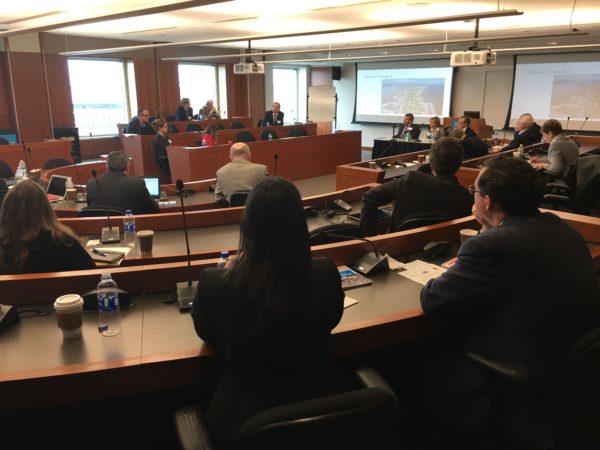
Increasing peace and prosperity amid climate impacts
With rising temperatures and declining water resources in more regions, a special meeting of The Hague Roundtable on Climate & Security at George Washington University focused on “Climate Risks and Resilience – Highlighting Initiatives to Face Common Challenges.”
With rising temperatures and declining water resources in more regions, a special meeting of The Hague Roundtable on Climate & Security at George Washington University focused on “Climate Risks and Resilience – Highlighting Initiatives to Face Common Challenges.” The 24 April event in Washington D.C. featured representatives from governments, NGOs, universities, and the private sector sharing strategies on how to improve livelihoods and reduce potential conflicts when trying to cope with climate impacts, especially in developing countries.
Matt Luna, the Roundtable creator and organizer, is also a communication consultant for PHB Development: “I’m seeking to increase international cooperation on climate challenges through this roundtable forum − to raise awareness of efforts and share strategies on adaptation. The situation is quite diverse in impacts and stakeholders, as climate-change often negatively affects such a broad spectrum of developments.” PHB and project partner organization SNV development organization were represented at the Roundtable in Washington.
Download the report from The Hague Roundtable in Washington
As PHB development expands its involvement in agriculture, it is increasingly confronted with the impacts of climate change. For example, a drought occurred in northern Uganda as PHB was helping in 2016-2017 to digitize payments in five different agricultural value chains. And as a hands-on organisation, PHB is providing technical assistance to two projects to help in climate adaptation: the STAMP project in Mali and its sister project, MODHEM, in Burkina Faso. These projects are financed by the Netherlands Space Office and implemented by SNV.
STAMP and MODHEM both aim to supply pastoralists with satellite data on the availability of water and biomass on the pastoralists’ migration routes. This can increase their income by reducing cattle mortality. Additionally, communication can take place if there is known to be sufficient water and biomass on migration routes. This satellite-based connectivity can help reduce conflict between migrating pastoralists and settled farmers, as cattle herds will be much less likely to destroy crops and burden increasingly scarce water resources.
Mobile phones are the interface with the pastoralists and the distribution channel of the information. Here, PHB can contribute with its core expertise, by supporting the business models of the mobile technology and helping to identify and solve operational problems. Ultimately, livelihoods of pastoralists and farmers are benefited through smart resource direction and avoiding conflict.
Contact us at info@phbdevelopment.com for more information on these and other international cooperation efforts. And keep a check on the PHB website for a special feature on not only how the STAMP program can help increase security, stability and prosperity in challenging areas such as Mali, but also how the project itself is threatened by instability in the country.
Co-hosted by the GW Elliott School and the Embassy of the Netherlands to the United States, this was the first international meeting of The Hague Roundtable. The forum aims to increase international cooperation on climate impacts including water scarcity, natural disaster/flood events, migration, and instability.
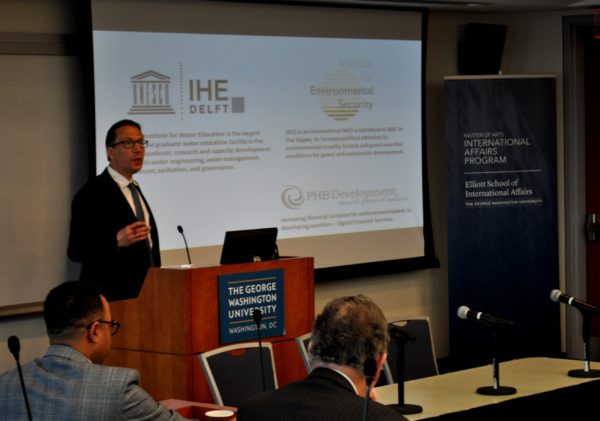
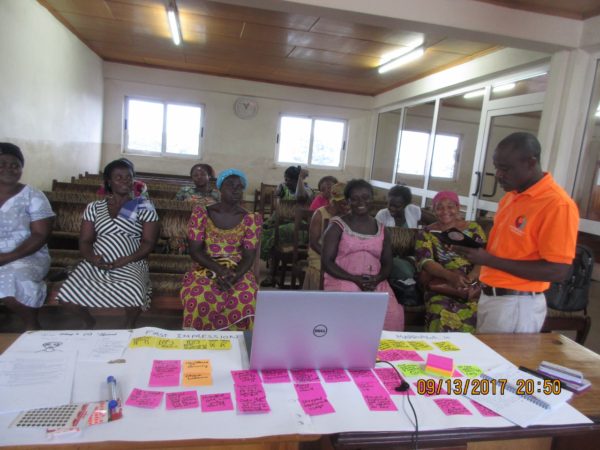
Gender-inclusive digital for true financial inclusion
Women in some countries have been historically under-represented in digital outreach and may tend to lag men in the uptake of newly-offered digital products.
Opportunity International is enabling more women to benefit from DFS
Women in some countries have been historically under-represented in digital outreach and may tend to lag men in the uptake of newly-offered digital products. In Ghana, for example, where Opportunity International (Opportunity) has a customer base of over 65% women, it was discovered that women represented less than half of the customers registered for mobile banking. Furthermore, when it came to the actual use of mobile banking services, women represented less than 30% of active users.
Opportunity is running a number of gender-focused initiatives aimed at addressing some of the barriers women face in using digital financial services and to pave the way for women to take part in the growing digital ecosystem. An Opportunity study with around 100 participants from three regions of Ghana shed light on some of the challenges faced by women clients in their adoption of mobile banking. These participants included women customers who had voluntarily registered for mobile banking, but had never used the service or had stopped using it shortly after registration.
The main gender-related challenges uncovered through the research were:
- Lack of sole ownership of a mobile phone (many women shared a phone with members of their household)
- Low levels of literacy and exposure to technologies
- Perceived self-doubt or self-blame in dealing with new technology-related products & services
“While the issues of phone ownership and literacy were commonly known to our staff, the findings around certain perceptions as a limiting factor for women were less understood,” said Dana Lunberry, a researcher with Opportunity Knowledge Management, who led the study. A number of the women expressed concerns around asking for assistance, and others had forgotten their pin codes and never asked for help because they were concerned about how their “forgetfulness” might be perceived. Women have often been characterized in industry literature as being less confident and more risk-averse than men especially when it comes to adopting new technologies. “Irrespective of the causes, these concerns existed and needed to be addressed,” added Nick Meakin, Opportunity’s Digital Financial Services Director for Africa.
With support from PHB Development, a set of women-focused training materials were developed in this Ghana initiative with an emphasis on creating a safe space that welcomed questions to support customers to build digital literacy. “The initiative helped field staff reconfigure their roles from being receivers of questions to question-seekers, and to perform more as coaches to help customers in their digital journeys,” said Ms Lunberry.
Opportunity’s gender-focused digital initiatives are moving forward with attention to the realities faced by individuals within their communities. Further work is set for 2018 to address some of the key challenges faced by a number of Opportunity’s women clients, such as low levels of literacy and technological exposure, through voice-based messaging and community outreach.
A goal is to not only to attract and assist female clients, but also female Agents. Experience in other countries has shown that women not only perform better than men as Agents, but also that female clients often feel more comfortable visiting a female Agent. And for a sustainable benefit, organizations must better understand offering the right products and creating the right environment to promote gender inclusivity, which can be a complex transformation that benefits communities overall.
Opportunity International and PHB Development have been teaming up through PHB Academy training programs to better target the implementation of digital financial services. For more information on PHB training and partnership activities with Opportunity International, contact Pete Sparreboom: psparreboom@phbdevelopment.com.
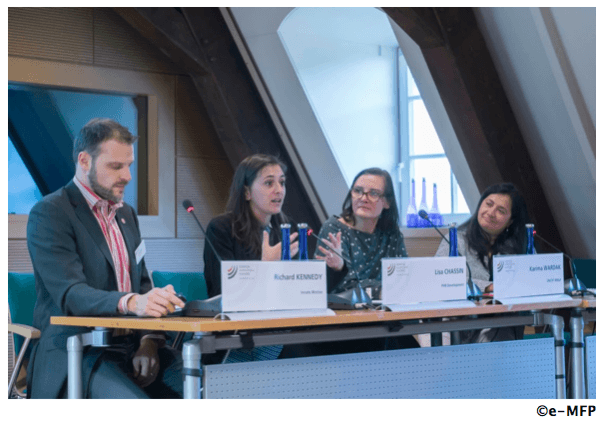
PHB at European Microfinance Week: Human-centric design, right to housing and empowering women
The European Microfinance Week 2018 brought together nearly 500 microfinance professionals from more than 60 countries to share expertise on human issues that can be improved through further cooperation in the evolving financial inclusion sector.
The European Microfinance Week 2018 brought together nearly 500 microfinance professionals from more than 60 countries to share expertise on human issues that can be improved through further cooperation in the evolving financial inclusion sector. PHB representatives Lisa Chassin and Ronald Everts contributed their expertise on developing topics in various sessions of one of the world’s top microfinance events in Luxembourg from 29 November to 1 December.
Lisa Chassin (second from left in photo) joined the Digital Innovation for Financial Empowerment (DIFE) working group that explored varied conceptions around human-centric design (HCD) to improve the impact of digital financial services. “This was an interesting first-time topic for the group,” said Lisa, “many tend to focus mainly on technology, and by putting the client back at the centre of our discussion we aim to better connect with the people we want to serve.”
A session on the final day featured Lisa on an expert panel, along with Karima Wardak with UNCDF MM4P, and Richard Kennedy and Glida Zarate Chabluk from Innate Motion. The panellists presented two projects they are conducting together in Benin and Senegal: the focus in Benin is to develop the digital ecosystem around the Zemidjans (merchant payments and digital tontines). In Senegal, they have been studying how to digitalise pension payments for former civil servants. The panel experts presented a step-by-step approach to an HCD project, including 1) stakeholder engagement on aligning objectives 2) ethnographic research and immersions for a more complete understanding of the people being served 3) co-creation sessions with partners and clients for an increased sense of ownership 4) implementing prototyping/action plans.
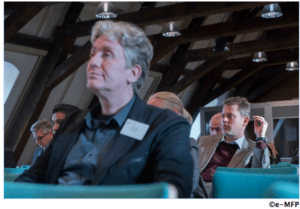
PHB’s Ronald Everts (in photo at above) pointed out developments in housing finance that are boosted by the United Nations’ focus on housing as a human right. “This, in combination with a feverish urbanization, creates opportunities for microfinance. Housing finance regulation varies widely per country, and making an investment in this sector can be cumbersome and knowledge-intensive,” shared Ronald about microfinance and housing. Additional EMW sessions attended by PHB included a training on the Social Performance Management tool SPI4, using the Cerise methodology.
An increasingly prominent focus with microfinance and at the EMW is the empowerment of women. It was pointed out that financers and investors should consider some central factors in making a positive impact:
- Women may often work part-time in their small enterprises, combining entrepreneurship with family tasks.
- Families of the women, including the men, should be incorporated in the approach to a sustainable empowerment of women.
The closing plenary of the EMW 2018 followed the theme of “Microfinance: positioning ourselves for the next decade” with “financial inclusion through technology” as an upcoming microfinance award focus. PHB Development continues to work toward its core mission of financial inclusion for all — often implementing mobile technology and innovative methods.
For more information on these PHB Development initiatives, contact:
Click this link to see more about the European Microfinance Week.
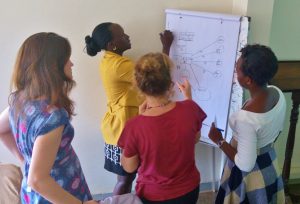
PHB Academy Embarks on new DFS Training Initiatives in Uganda
“Complex issues were made understandable, drawn from extensive Ugandan and global experience,” said Tamsin Scurfield of Opportunity International about participating in a recent PHB Academy training in Kampala, Uganda.
“Complex issues were made understandable, drawn from extensive Ugandan and global experience,” said Tamsin Scurfield of Opportunity International about participating in a recent PHB Academy training in Kampala, Uganda. A dozen people took part in the 5-day course – 27 Nov. to 1 Dec. – from organizations including FINCA Uganda, FINCA International, Opportunity International UK, Opportunity Bank Uganda and Uganda Management Institute.
The hands-on, interactive sessions covered understanding the Digital Financial Services (DFS) ecosystem, selecting a DFS business model, agent banking, mobile banking and partnerships, and funding DFS. “The week after training, we used the material to guide into a DFS strategy. A draft strategy has now been put together and the training provided a clear roadmap for this – so participation was very relevant,” added Tamsin about the courses.
These training sessions were held at the Uganda Management Institute (UMI). Courses facilitated active sharing of expertise from both instructors and participants and were intended to be the first in a series of such sessions. “Not only did the facilitators give sufficient and relevant examples, but they also allowed us to bring own examples,” said Don Twine, from FINCA Uganda, who participated in the training. PHB is further coordinating with the UMI to establish a partnership around training and consulting to support the ambitious Uganda strategy for financial inclusion, with the next training session scheduled for March 2018.
Mr Philippe Breul and Dr Henry Clarke Kisembo, of PHB Development/PHB Academy, led this course instruction in Kampala. “We’re also working with FINCA and Opportunity International on an ambitious financial inclusion initiative for the South Sudan refugees in Uganda, as part of the in-depth work done during the training, said Philippe.
Objectives in this training course included:
• Understanding ways to use technology to further the goals of a financial institution.
• Understanding DFS concepts and distinguishing different business models.
• Understanding the costs and risks of DFS for different stakeholders.
• Being able to strategize with senior colleagues about DFS priorities.
• Being able to assess potential partners and help negotiate mutually beneficial deals.
• Being able to sell DFS projects to regulators, boards, owners and funders.
And coming soon on the PHB Development website: The PHB Academy Training Catalogue with details about our specialized learning opportunities on Digital Financial Services!
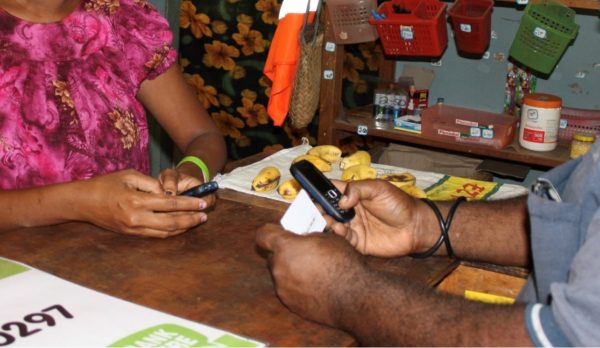
Increasing use of Mobile Money in Low-income Areas
The implementation of mobile money in developing countries is aimed at having the highest positive impact on the livelihoods of the poor.
Challenges and Solutions: Increasing the use of
Mobile Money in Low-income areas
The implementation of mobile money in developing countries is aimed at having the highest positive impact on the livelihoods of the poor. It is therefore important to identify some factors which may hinder the successful use of mobile money, and strategize how to overcome various obstacles in different geographical areas.
Language and product literacy
If someone does not understand a device and/or the language of its operations, then it is difficult for them to use it. This can be an obstacle in the success of mobile money that should be addressed with effective marketing and operational strategy, using visual and voice approaches, especially in rural areas of developing countries.
People in developing countries may not own a mobile phone due to the cost. And in cases which the poor may own a mobile phone, they may still be accustomed to their established systems of cash management. In these scenarios, using customer-centric approaches to develop products that take people’s needs into account can help foster adaptation and adoption.
Demographics
Young adults can be quicker to try out new technical and subsequent financial services. Convincing young adults to adopt mobile money services and then to spread the word among their neighbourhood and families can be plausible but still challenging, a route to success.
Agent professionalism
Product competence and behaviour of agents toward customers can make the difference in a positive approach to increasing use products and services – or a failure to deliver the needed support to enable customers to use mobile money systems.
PHB Solutions
To overcome some of these issues that may inhibit the positive impact of mobile money, PHB Development has been working with providers on identifying various solutions such as:
- Implementing voice recognition technology and call centers to support less literate customers using mobile devices;
- Using pictograms, icons and visual communications to explain the product, and to support customers;
- Ensuring products are developed in the most-spoken languages of the country in focus – not just the official language;
- Using a human-centred design approach to develop products addressing customers’ needs, therefore establishing tangible benefits for those are using or will begin using the mobile products and services;
- Ensuring customers are involved throughout the whole design and development process of a new product with regular interactions. This “rapid prototyping” is an opportunity to test a new product and its features with customers to see if they can understand and use it easily. Product developers can then make needed adjustments before a larger pilot and the rollout;
- Identifying and recruiting product ambassadors and early adopters – especially among the youth – to explain to their community how DFS services can be used for personal and community benefit;
- Ensuring a value proposition and a compelling business case is developed for agents and other stakeholders in the ecosystem while motivating agents to promote the product and effectively support customers;
- Addressing the adoption of mobile money with an ecosystem perspective, ie creating use cases to ensure people do not need to cash out mobile money but can use it to make payments and needed transfers.
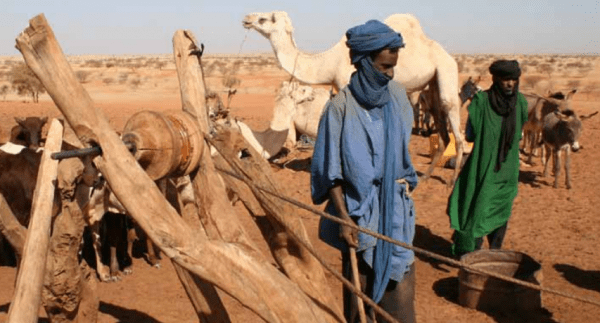
Sustainable Technology Adaptation for Mali’s Pastoralists
G4AW aims to stimulate the use of satellite gathered weather and biomass information, distributed via mobile phones to smallholder farmers, pastoralists and fishermen in developing countries, thus enabling sustainable yield and production increase.
In 2015, PHB Development supported the Netherlands Space Office (NSO) in the context of the Geodata for Agriculture and Water Program (G4AW). G4AW aims to stimulate the use of satellite gathered weather and biomass information, distributed via mobile phones to smallholder farmers, pastoralists and fishermen in developing countries, thus enabling sustainable yield and production increase.
Of the many projects that applied for a G4AW grant, NSO had selected 22 proposals for further evaluation. PHB assisted, by focusing on the business case, the composition of the project partnership and on the ‘last mile’ to the smallholder farmers. *
PHB was also involved in giving workshops to the actual grantees, presenting the findings of the PHB proposal evaluation and advising on how to improve the project plans. During the workshop for STAMP (Sustainable Technology Adaptation for Mali’s Pastoralists), the project showed interest in additional PHB support.
STAMP provides access to satellite information for pastoralists in the Gao region of Mali, in order to help them better plan their work routines. Data on biomass availability and quality, water availability, herd concentration and market prices for livestock and staple grains are examples of services, made available to subscribers through basic mobile phones.
STAMP consist of a powerful partnership:
- SNV Netherlands (lead)
- Action Against Hunger
- Hoefsloot Spatial Solutions
- Institut d’Economie Rurale
- Project Concern International
- ORANGE
PHB supported with making the extensive partnership work for the project. It provided advice on how to structure the contract. Next, PHB founder Philippe Breul travelled to Bamako, Mali, for three days of meetings with partners to fine-tune the working business logic of the project.
PHB Consultant, Ronald Everts, who has been involved in all stages aforementioned states: “Financial inclusion is our 1st focus, but PHB can bring added value in bridging ‘the last mile’ to low-income people in other lines of business as well. It is fascinating and exhilarating to see how mobile phones can be the interface to many services. STAMP is now entering the next phase, and we wish and expect the project all possible success. ”
*The G4AW program has a new round of grant provision this year.
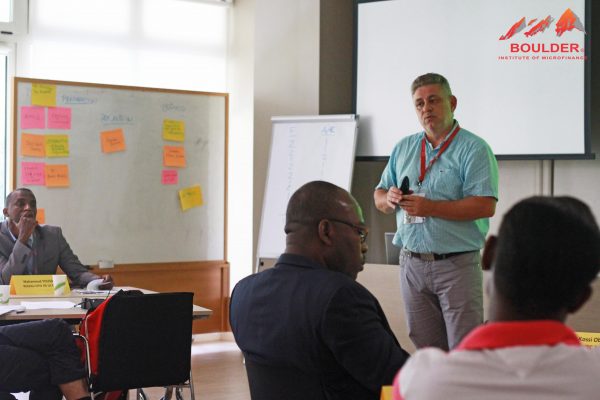
Adapt or Die! A Changing Landscape for Microfinance
“A large part of the financial sector is not adapting well to new market environments and seems to have lost focus on the mission to provide financial services to the poor,”
How are changes in technology and customer preferences driving the financial inclusion market? What is PHB Development doing to deliver in this changing landscape? PHB founder, Philippe Breul, and PHB Academy Co-Director, Pete Sparreboom, share insights on trends and solutions to connect with customer needs:
With the support of PHB Academy, Philippe taught two courses in the Summer 2017 session of Boulder Microfinance Training in Italy, which was also the first year that Boulder featured a special track on digital finance (DF). In a sign of the times, DF courses were oversubscribed, and additional instruction was added to help meet the demand.
“A large part of the financial sector is not adapting well to new market environments and seems to have lost focus on the mission to provide financial services to the poor,” said Philippe about trends he is seeing in the sector, “By conducting extensive client research, PHB helps financial institutions develop new products that deliver a good value proposition to both the institution and customers. This helps them stay faithful to their original mission.”
PHB Academy conducts research and provides online instruction on how to stay ahead of changing needs of the market, and apply innovations to deliver the right services to customers. Pete Sparreboom, PHB Academy Co-Director, said “Microfinance institutions that do not adapt to demand are putting their portfolio and bottom line at risk. It’s important to address clients’ demand for services that will save them valuable time and effort. Mobile money operators are getting ahead of traditional MFIs because clients are no longer accepting to wait several weeks for loans after complicated applications and travel distances to branch offices. Customers expect convenience and ready access to a range of services. It’s that simple.”
The Digital Finance Toolkit series (from PHB, UNCDF MicroLead and the MasterCard Foundation) allows financial institutions to connect effectively with the market and customers through the introduction of digital financial services. “PHB is striving to remain a leader in the sector through a human-centric design approach to mobile technology,” said Philippe, “We conduct extensive field research that leads to prototyping, testing and then the development of a solid strategy that covers the customers’ needs.”
For the future of microfinance institutions, Philippe said, “It’s crucial for microfinance institutions to update their operational models and strategies, and bring the changes prominently into the market. It is really an adapt-or-die situation. PHB with PHB Academy is leading the way to deliver modern benefits in line with our mission and values of financial inclusion.”
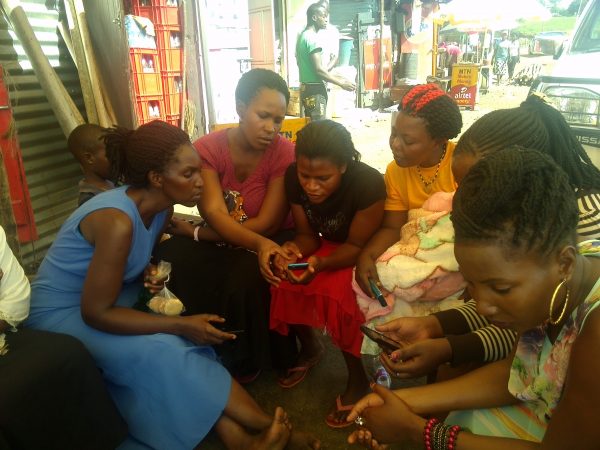
Work (and play) in an Active PHB Summer
PHB Development recognizes the importance of a healthy of balance work and home life, so while many of our associates and clients are enjoying summer holidays, we also ensure that existing client needs are met in a timely manner.
PHB Development recognizes the importance of a healthy of balance work and home life, so while many of our associates and clients are enjoying summer holidays, we also ensure that existing client needs are met in a timely manner. As this Summer 2017 season nears an end, we would like to take a brief look at the results some of our staff have been pursuing.
Isabelle Musat has been busy in the continuing development of a series of Toolkits for financial service providers, in partnership with UNCDF MicroLead and the MasterCard Foundation. The series of 6 practical Toolkits is designed to guide financial institutions in introducing digital financial services and boosting their uptake. Four of the hands-on guides have been published so far, and have been described as a “recipe for success.”
Chris Statham lives in Malawi and is supporting FINCA Malawi through research, implementation and the launch of a mobile savings-and-loans product. His efforts include assisting in applications for funds that will be used to create and introduce innovative DFS products. Chris supports FINCA Zambia in their proposal for Mobile Savings and Loans product funding, and is also part of the ‘Toolkit team’.
Andrew Tumwesigye is working on the pilot phase of DFS implementation at Mcleod Russel tea company in Uganda. He is supporting various aspects for the payment service provider MTN to scale payments to tea workers at the Muzizi tea estate:
- Designing payee registration processes
- Payment processes & procedures
- Activity work and roll out plans, including training and sensitization
- Pre & post payment assessments
Jean Daniel Baloucoune is based in Senegal and working on the diagnostic study of the capacity of La Banque Centrale des Etats de l’Afrique de l’Ouest (BCEAO). The study analyzes payments data and payments systems, aiming to identify commercial opportunities and refine BCEAO’s regional financial inclusion strategy. PHB is happy to be meeting the needs of its clients during the summer months and our staff are looking forward to new possibilities in the rest of 2017 on onward!
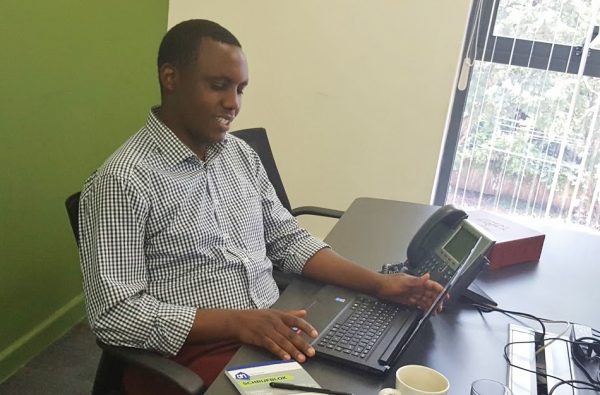
Interview with PHB Associate Emmanuel Mudahemuka
Emmanuel Mudahemuka is based in the Netherlands and specializes in external mid-term and post evaluations of programs for regions including North Africa.
PHB Development associates and consultants are deployed in various countries working on projects to serve clients. Emmanuel Mudahemuka is based in the Netherlands and specializes in external mid-term and post evaluations of programs for regions including North Africa. As a PHB associate, he was happy to share thoughts on his field experience for the PHB blog.
What are your current projects?
I am working on a mid-term evaluation for the Swiss Investment Fund for Emerging Markets in a North African focused initiative. My role involves reviewing evaluations and conducting field interviews to assess if the intended objectives are being met.
What challenges you are facing in the field?
The biggest challenge is non-cooperation from the beneficiaries, especially if the evaluation concerns a closed project and they don’t clearly see the benefit for them. Quite often, there are multiple views of who is the targeted beneficiary of the project between the project sponsor and other stakeholders. For example, there may be several definitions of what is a small and medium enterprise depending on the stakeholders: banks, microfinance institutions, governments, tax authorities, NGOs etc.
What interests you the most about working on the field?
While interviews are sometimes conducted over the phones, the field visits help provide a complete understanding of the background and situation of the people. The combination of interviewing people, observation and environment scanning allows me to more accurately place the project and discussion in the local context.
What has been your best on-field experience and why?
My trip to North Africa, where I found small and medium enterprises that were very professionally managed – I visited several successful enterprises that should serve as role models. The enterprises included a private engineering school, a pharmaceutical company and a logistics company. These companies provided jobs and training, while also supporting local economies.
Why do you work in financial inclusion, and what do you like best about working for PHB?
Before joining PHB Development, I worked for over seven years in financial services industry in Rwanda. It started as a simple idea: What can I do to help my village, and for other African villages to have access to opportunities and lift themselves out of poverty? PHB Development gave me a platform to channel my passion into helping people improve their access to finance.
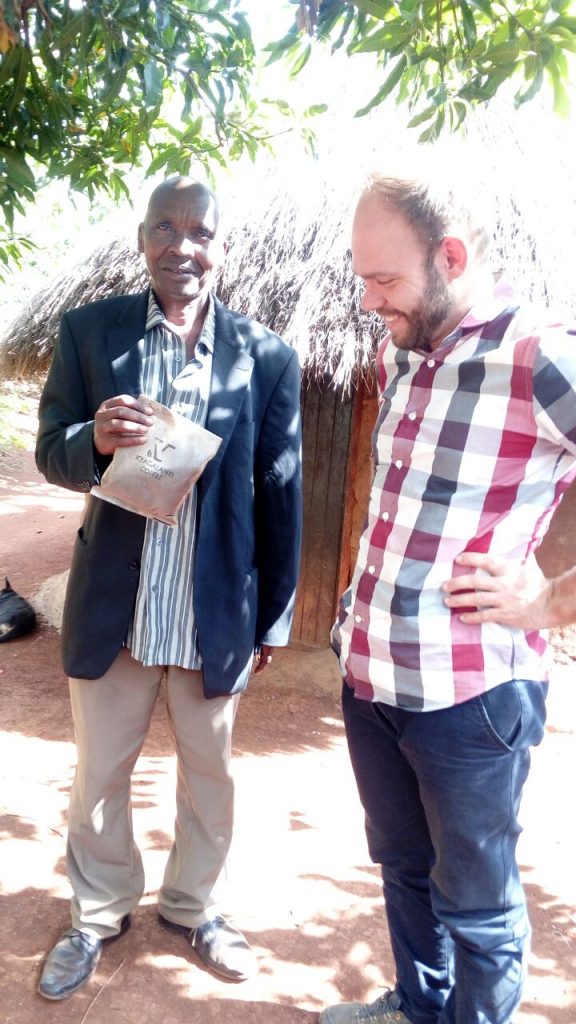
Interview with Pall Kvaran
PHB Development values the diversity and innovation that its consultants can bring to developing financial inclusion systems nearly anywhere on the planet. PHB Associate, Pall Kvaran, recently shared views from his current work in Uganda.
PHB Development values the diversity and innovation that its consultants can bring to developing financial inclusion systems nearly anywhere on the planet. PHB Associate, Pall Kvaran, recently shared views from his current work in Uganda.
What are the areas of need you currently working on?
I am working on two different projects, one in tea and one in coffee, both focused on helping farmers gain access to digital financial services. We move towards achieving this goal by digitizing the payments farmer receive for their major cash crops. By doing this, we help them get access to services such as savings accounts and loans through mobile money.
What are the challenges you are facing and what are you doing to solve them?
The coffee project I am working on is all about problem-solving. This project is funded by CGAP and UNCDF, and we are working with one of the largest coffee companies in Uganda. UNCDF has been working on digitizing payments to farmers for a couple of years and PHB was tasked with doing a deep dive and figuring out what the most important problems are and how to solve them in order to make the digitization effort work as effectively as possible.
We used a new method we call Value Proposition Mapping, where we essentially mapped all income and expenses farmers and traders in the coffee value chain engage in on a month to month basis over the course of a year. We then calculated the costs of cash and digital payments for each transaction type and figured out which ones are ready for digitization, depending on the value propositions farmers and traders face.
What is the most interesting or surprising thing that you have encountered in the field?
The extreme level of interest farmers has in spending management. Almost every farmer I have spoken to in my work in a range of different agriculture value chains sees mobile money as helping them manage their own spending to save up for investments. This can be even more true for women because they are usually not the head of the household and thus have a hard time controlling how the money they make is spent. Mobile money can really help them keep a part of their income for themselves and save up for future investment.
Where are you seeing as the current and potential impacts?
In the short term, I see the digitization of payments in agriculture value chains having a positive impact on spending management as well as the risks farmers face. Being paid with mobile money allows people to store their money safely as well as reducing the risk they face while travelling with cash. In the medium and long term, as more affordable financial services will be offered through mobile money platforms I see these farmers gaining access to interest-bearing savings accounts, loans for investments and important risk mitigation services such as crop insurance.
The current agricultural productivity in Uganda is multiple times lower than what it can and will be in the near future. I believe these services are of vital importance when it comes to helping farmers in developing countries increase their production and income.
How do local traditions and ways of doing business affect your work?
I believe my work as a PHB consultant is actually centered around this very question. My job is gain a deep understanding of local contexts and use that understanding to figure out how we can best help people. I think our coffee value proposition mapping methodology does this exceptionally well, especially when we get a chance to combine it with more qualitative human-centred design methodologies.
Why did you choose to work in the field of financial inclusion, and what do you like best about working for PHB?
I strongly support development policies focused on helping people help themselves and I feel financial inclusion is exactly this. I believe the people we are trying to help are best qualified to decide what they need in order to help them better their lives.
I think providing access to financial services is one of the most important pieces in this puzzle. If we are able to give people access to interest-bearing savings accounts and loans for investment, they have been given a set of tools they can use to decide themselves what goals they want to work towards
When it comes to PHB Development, I really like the cooperative nature of the company. Most of the success of the company is channelled into reinvesting for growth and increasing possibilities. Rather than being typical employees, we function more like a group of independent consultants who work closely together towards our common goals.
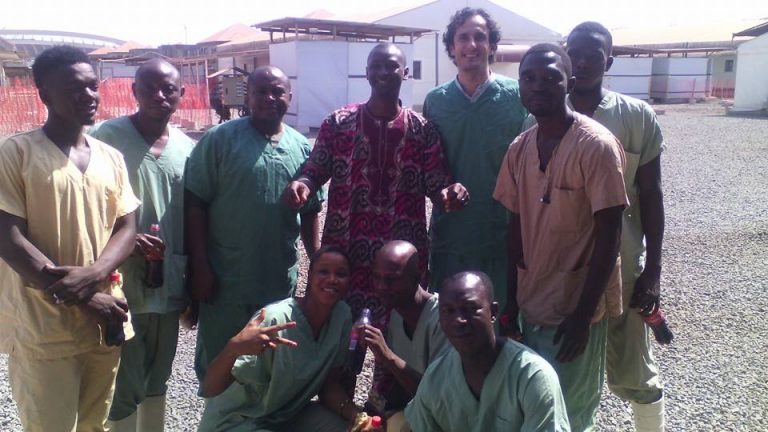
Helping Refugees through Financial Inclusion
The needs of an estimated 22.5 million worldwide refugees fleeing conflict and instability go well beyond food and shelter.
PHB Partnerships on DFS to Help the Displaced and Emergency Workers
The needs of an estimated 22.5 million worldwide refugees fleeing conflict and instability go well beyond food and shelter. Access to financial services for refugees can enable those who are otherwise disconnected from their homes to mitigate the immediate financial shocks of displacement and take steps toward future opportunities. Continuing economic activity will help the displaced and aid workers to be more self-sufficient when they return home from temporary settlements.
Digital financial services (DFS) can offer refugee families such a way to meet current financial needs and plan for their future. DFS providers are increasingly tailoring services such as Mobile Money and e-payments to assist refugees through easier access to money and the ability to make financial transfers. Benefits include eliminating the risks of travelling long distances to conduct cash transactions and increased the potential to build an economic base. The long-term impacts can benefit families and regional economic stability.
Productive Safety Net Program in Ethiopia
PHB Development worked in Ethiopia with the Ministry of Finance and Economic Development for a project of the World Bank on initiatives to provide refugees with DFS – with the aim of improving their conditions through access to basic financial transactions. One example is the Productive Safety Net Program (PSNP) that enabled social transfers through digital services. Through the PSNP, recipients were able to access digital payments with full control in a timely and secure manner, with no deductions. These e-payments also helped build a culture of savings for the recipients, leading to greater financial inclusion and brighter future prospects. In addition, PSNP benefited the government and fund providers as it decreased the time, cost and fiduciary risk of cash transfers.
Remittances in Syria
PHB along with CGAP and GIZ (Jordan) worked together to provide DFS for Syrian refugees in Jordan, by implementing a secure method of transfer remittances. Such remittances are often vital for refugees, as they receive this needed money from friends and relatives in other areas. After having lost their own source of incomes, refugees have been able to receive and transfer money safely and at a low cost, through innovative DFS programs.
There is continued potential for DFS to contribute to the economic and social development of the displaced as well as their home social structures. Even modest economic activity helps raise their quality of life through better access to health services, material necessities, education and interaction outside of their temporary settlements.
Umberto Trivella (in the picture, third from right standing) on an Ebola follow-up project in Guinea.
Emergency Help to Ebola Workers in Sierra Leone
In the provision of digital services to Ebola workers located in Sierra Leone, PHB carried out agreements with local banks and money transfer providers including Airtel, Africell and Splash to transform a system that used cash currency into a system of mobile payments. This program made it easier for aid workers in the country to conduct financial transactions and receive payments through a cloud-based payroll system. The mobile payments also helped reduce fraud, theft and errors in payment to workers.
PHB consultant Umberto Trivella commented on this project: “We held discussions with workers at Ebola treatment centres to better understand their cash payment challenges and how digital channels could improve the situation. It was a good experience to enable these young workers at the forefront of the battle against Ebola to receive timely payments for their high-risk efforts.”
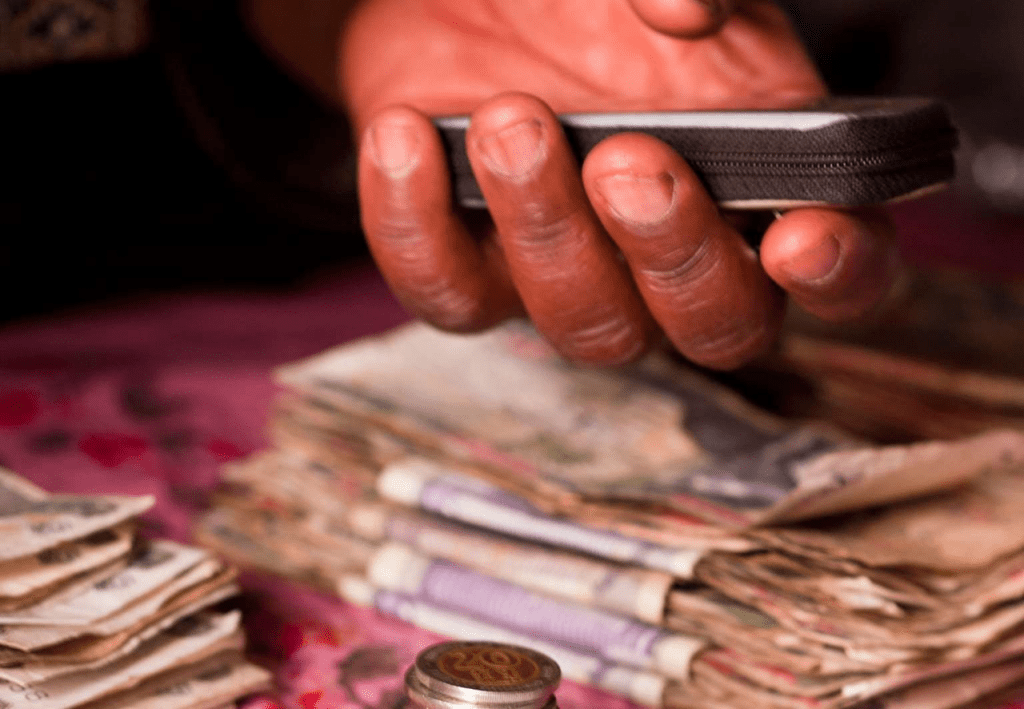
Agents-The Revolution on the Ground in Lao PDR
The mixed emotions of excitement and nervousness would be the best way to describe how new branchless banking agents feel in the Lao People’s Democratic Republic (Lao PDR).
Republished from the UNCDF MM4P website: https://www.uncdf.org/article/2507/agents-revolution-on-the-ground-lao-pdr
Vientiane, LAO PDR – The mixed emotions of excitement and nervousness would be the best way to describe how new branchless banking agents feel in the Lao People’s Democratic Republic (Lao PDR). For many prospective agents, who humbly regard themselves as rural, less-educated people, having the opportunity to work with the country’s largest bank is an unusual, unexpected opportunity.
In June 2015, one of the country’s leading banks—Banque pour le Commerce Extérieur Lao Public (BCEL)—launched a new concept in banking for the country: branchless banking through agents, a service the bank branded as BCEL Community Money Express (BCOME). The project was supported by United Nations Capital Development Fund (UNCDF), its national implementation programme Making Access to Finance More Inclusive for Poor People (MAFIPP) and PHB Development, from concept through pilot and on to commercial launch. Today, BCOME has more than doubled the size of the BCEL branch and service unit network, and with more than 125 agents, it is represented in every province of the country.
One of the most outstanding agents in the country, Nouteng Sybounheueang of Souvannaphoun Village in Paklai District, briefly shared her story:
First, I was worried [that] I did not make the decision right away when the staff of BCEL approached me about being an agent. I just replied to them that I needed time to think about it. And in my thoughts, I started to wonder how can one walk into my shop and offer me such a big job? Being a bank’s agent, how much money would I have to have? What kind of tasks would I be dealing with? I am only a low-educated rural woman, running a small shop selling miscellaneous goods, and I had never touched a computer or iPad.
After taking a night to think it over, Mrs. Sybounheueang called bank staff the next day to confirm her interest. She then spent two weeks preparing the agent documents, to apply and to be approved. After that, she transformed a storage room for her goods into her new office. She purchased a laptop and a printer as required by the bank, though as she completed primary school only, she did not know how to use them. However, the BCOME team arranged a one-day training at her place on how to use the computer, how to access the BCOME system and how to conduct transactions for her customers.
Mrs. Sybounheueang was among the first few BCOME agents registered in July 2015 when the project was still in its pilot phase. Since that time, BCEL has expanded the BCOME agent network across the country, with over 128 agents in every province and a target of 410 agents by the end of 2019. Yet, the quantity of agents is less important to BCOME than the consistent, high-quality service that agents must deliver. As the agents are the face of the service and there is a reputation risk to the bank for non-compliance, the quality of the service should be its first priority.
BCEL supports its agents in several ways, such as the service system, technical and operational training, marketing and publicity material, and encouragement of the agents to do conscientious self-promotion, carefully focusing on three components of performance: trust, high visibility, and location.
A successful agent like Mrs. Sybounheueang attributes her success to these three attributes but primarily to the trust she has from her customers and the bank. She knows how to use the promotional material (brochures and posters) that the bank provides, and she speaks to her community about the value of the BCOME service and the convenience it can offer them. Situated on the main road, her location is premium and highly visible. Her converted storage room serves as a dedicated BCOME service office, providing her customers a comfortable environment to conduct their transactions. She is now involved in supporting the construction of a new market for the region that is only 100 metres away from her agent location. When completed, the market will attract more customers to transact at her location.
Agents in different parts of the country serve communities with different standards of living and different circumstances. Khaek Phanthalath, an agent in Ban Tha Kok Hai, Pak Ngum District (a village about 50 kilometres from a city), explained that the transaction type that she deals with the most is receipt of remittances. People from other provinces send money to their parents or relatives who live in the village or nearby, and they come to get the money at her shop. In contrast, Mrs. Sybounheueang, the agent from Paklai District, mostly serves customers who send money to their children who are studying in the capital or other large towns. Another agent, who represents BCOME in the busy and crowded capital of Vientiane, handles more business-related transactions.
These various use cases and requirements from different communities are carefully considered by the BCOME development team, as Nanthalath Keopaseuth, Deputy Director at BCEL, explained, “Sometimes our development team even thinks that we should modify the specific product to meet the particular need of each province and locality. This is a subject that we are thinking about for the possible development of our service—we keep thinking how we can create the best product to fit the rural community.”
It is noticeable that most BCOME agents are women—women who have a business to manage, who hold a lot of responsibility in their family and who are eager to support their community. All are happy to bring the service to their village and provide more convenience for their relatives and fellow villagers, to save them the time and money of traveling a long way to a city to complete their transactions. For farmers in their village, the agent’s extended service hours, from early morning until late in the evening, help them so that they are able to focus on production and not lose valuable time conducting transactions; they can stop by and do the transaction whenever is convenient. Suddenly banking is easier and less stressful.
The commission is not the only benefit of being a BCOME agent. Agents also build friendships and share convivial moments during their workday. They also benefit from the prestige conferred on them by the brand of the first commercial bank in the country, giving them considerable standing in their local community. And, the new, efficient service of BCOME draws in more customers to agents’ existing business location; it helps their existing business grow.
BCEL has brought the new age of banking—branchless banking—to Lao PDR with a service that relies on local people becoming engaged as agents to serve their own community at their community members’ doorstep. BCOME is designed to help a new group of customers, who have until now been unfamiliar or even unaware of financial and banking services, experience these services and benefit from them. In fact, BCEL has discovered just how much money flows from people in remote, rural areas to the capital city of Vientiane and other main cities, for their children’s education, for their families and for their commercial needs.
With their enthusiastic approach to providing accessibility and to helping support growth of their communities, agents are raising the awareness of villagers (e.g., through careful self-promotion at their agent location) and educating them about the low risk, inexpensive cost and speed of the new system. BCEL supports agents with periodic awareness-raising campaigns to promote overall services of the bank, while focusing attention on the agents as the primary source of the service in the community.
As Mrs. Sybounheueang summarized, “I can give them friendly advice to use this new service—it is convenient and safe. Before they sent money to their children by a bus driver. Their children would come to pick up the money at the bus station, but they had difficulties with timing and missing the bus. It was high risk. Now more and more come to use my service. They like it here because some of them feel uncomfortable to go to the bank branch.”
June 2017. Copyright © UN Capital Development Fund. All rights reserved.
The views expressed in this publication are those of the author(s) and do not necessarily represent those of the United Nations, including UNCDF, or their Member States.
For more information, please contact
KM Consultant, Lao PDR
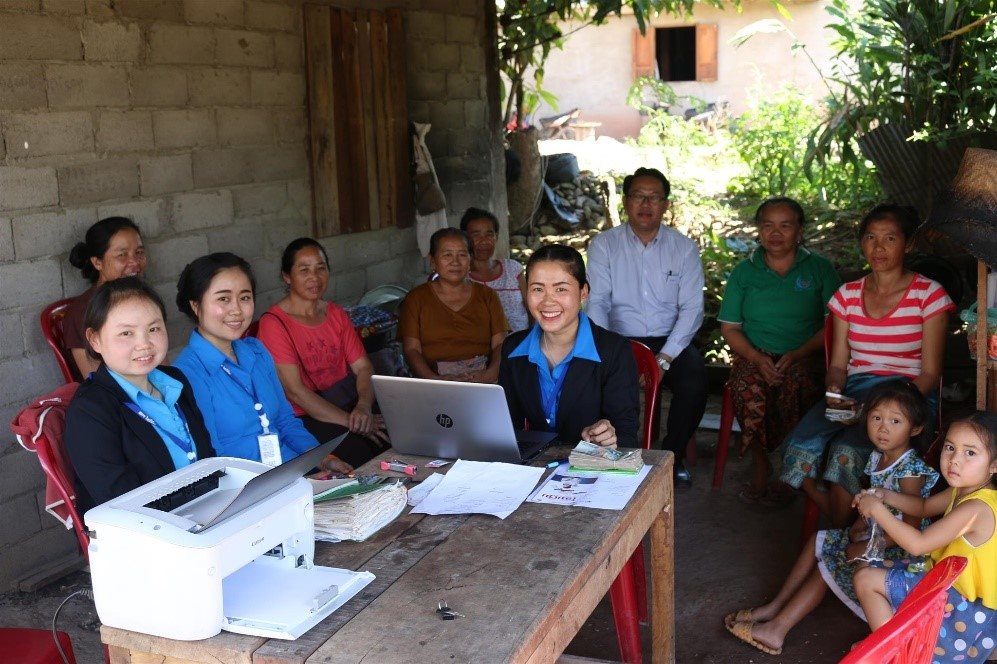
The Roaming Agents of Lao PDR
This pilot initiative is supported by the UNCDF Making Access to Finance More Inclusive for Poor People (MAFIPP) programme jointly operated with the Bank of Lao PDR, with support from the Australian Government and technical assistance from UNCDF MM4P.
Republished from the UNCDF MM4P website: https://www.uncdf.org/article/2940/the-roaming-agents-of-lao-pdr
On October 16th 2017, Yong Duangphachanh did not make the 2-hour journey to a banking agent point in the district town to deposit money for her children’s educational fees. Instead, she attended a Xainiyom Micro Finance (XMI) center meeting in her village in northern Lao PDR and was the first in her area to experience the latest evolution in branchless banking.
XMI has partnered with BCEL’s Community Money Express (BCOME) and since February 2017, has been providing BCOME transactions to its customers via their 7 branch offices; including Beng where Yong Duangphachanh has her XMI account. But what delighted her was that now she did not have to travel to the agent - now the agent could travel to her.
This pilot initiative is supported by the UNCDF Making Access to Finance More Inclusive for Poor People (MAFIPP) programme jointly operated with the Bank of Lao PDR, with support from the Australian Government and technical assistance from UNCDF MM4P. The programme aims to integrate microfinance institutions (MFIs) into the digital finance ecosystem in appropriate ways. As a follow up to MAFIPPs “Training on Digital Finance and Interventions Models for MFIs” in and building upon the UNCDF MFI strategy toolkits to enter the digital financial service (DFS) arena, XMI was ready to take the next step.
To provide convenience and continuous service to its remote customers XMI conducts weekly center meetings in all villages accessible by motorbike. Meetings only occur in the mornings and take about one hour typically for clients to make loan repayments, to deposit or withdraw on their savings accounts. Now, as part of the center meetings, the XMI field staff travels to the community with a laptop, printer and, most importantly, a 3G Pocket Wi-fi router to allow the loan officers to connect to the BCOME platform. There are already plans to replace the equipment with a more portable tablet and a pocket-sized Bluetooth printer. Although now customers can avail opportunities like BCOME transactions including depositing and remitting funds. Currently, XMI conducts center meetings in 3 provinces (Oudomxay, Luang Namtha, Bokeo) and 14 districts covering 415 villages.
And with all that travelling, XMI staff are well known in the communities that they serve, and they look for innovative ways to bring valuable services and raise awareness about them. As part of their mission, they conduct promotional activities at schools. Such as the outreach to high school seniors conducted by XMI at Meuang Beng High School where students were introduced to the benefits of savings and educational loans. Although XMI accounts cannot be opened by minors, it is presumed that parents will be able to avail of these services on their behalf. Additionally, XMI explained how BCOME transfers can help students who study away from home and need to receive financial support from their relatives.
XMI continues to make further inroads for financial inclusion and values its relationship with BCOME as it is a positive way to associate with BCEL (the largest bank in Lao PDR with 41% market share in retail savings and 4% in lending). The association makes people more confident in conducting banking and financial services with XMI.
This pilot activity of offering remote transactions has been well received by customers but it is not without its challenges. BCEL is cautious about allowing agents to conduct transactions away from the designated and approved premises. BCEL understands the importance of trust in agent banking transactions. And they ensure it by having an authorized signboard and customer pricing clearly displayed. XMI and their well-trained staff could offer significant assurance to BCEL. XMI has been authorized by BCEL to conduct only on-line BCOME transactions so that the BCOME remittance occurs in real-time. The customer either gives cash or the amount is debited from her/his savings passbook – the transaction will be recorded in the XMI monitoring information system only when the credit officer returns to the Service Unit. The XMI savings passbook (containing the client’s picture) can be used for formal client identification in lieu of the common ID card of the family book – a procedure mandated by BCEL to fulfill the anti-money laundering obligations applicable to commercial banks.
XMI is hampered by the lack of suitable mobile data connectivity in many communities, which would require offering off-line transactions. For example, when a customer wants to deposit or remit funds, that transaction would be executed once the officer returns to the branch office where there is a stable internet connection. BCEL is considering authorizing off-line transactions based on the success of this initial pilot with a roaming BCOME agent.
“A service such as this makes banking more accessible and can also increase business for us,” said Khanthaly Saenvilayvong, Managing Director of XMI. He accompanied the team on this first experiment and is pleased and proud that XMI is the first to bring a real-time DFS solution to a remote community in northern Lao PDR. “These DFS services will continue to develop and provide opportunities to offer more and more services - once people become aware of the service they will try it and then become regular users due to the security and convenience.”
XMI key figures (as of Q3 2017 unless stated otherwise, source: mixmarket.org)
| Nb clients | 34,280 (60% women) |
| Nb borrowers | 9,223 (72% women). Largest Lao MFI by number of borrowers |
| Loan Outstanding | 45.1 billion Kip ~$5.4mn. Agriculture loans 65-70% of the portfolio |
| Portfolio at Risk 30days (PAR30) | 2.29% |
| Total assets | 57.0 billion Kip ~$6.9mn |
| Return on Assets (RoA) | 11.9% (2016 annual) |
| Nb Service Units | 7 all acting as BCOME Service Points |
| Nb & value BCOME transactions | 117 with total value 259,457,000LAK ~USD 31,600 (October 2017, at roaming agent and XMI Service Units combined) |
DFS Expert, Lao PDR
For more information, visit
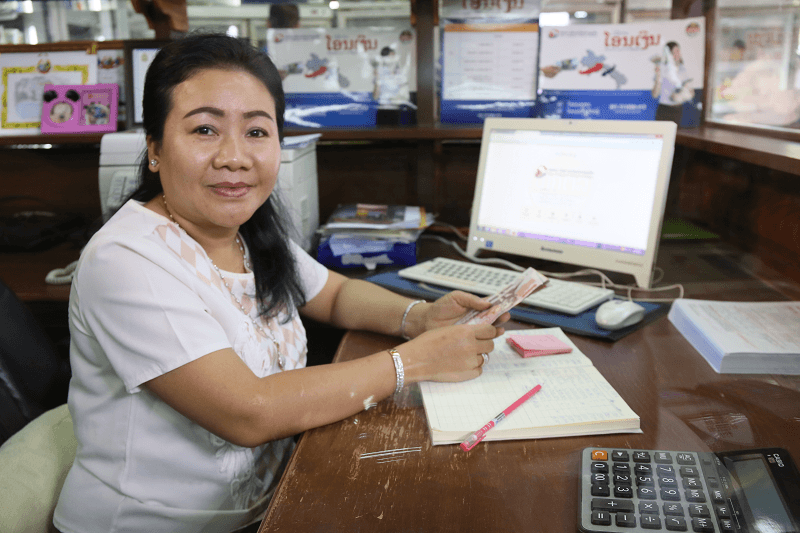
Creating a new world of banking in Lao PDR A vision for branchless banking realized
On 12 May 2015, the first branchless banking transaction was completed in a rural village in the Lao People's Democratic Republic (Lao PDR).
Republished from the UNCDF MM4P website: https://www.uncdf.org/article/2528/creating-new-world-banking-lao-pdr
On 12 May 2015, the first branchless banking transaction was completed in a rural village in the Lao People's Democratic Republic (Lao PDR). This ground-breaking transaction took place with a service launched by Banque pour le Commerce Exterieur Lao Public (BCEL), one of the country’s leading banks. The service, BCEL Community Money Express (BCOME), was the first of its kind in this largely agrarian and rural nation.
Digital financial services (DFS) in Lao PDR can have significant impact by providing access to services that the dispersed population is sorely missing. The first branchless transaction opened a new world of banking that is fast, safe, inexpensive, convenient and reliable, though the story behind the project was neither swift nor simple. The journey to launch digital finance and branchless banking took investment and planning that began years ago, in 2012, with the engagement of the Bank of the Lao PDR (BoL) and the United Nations Capital Development Fund (UNCDF).
Bringing digital finance to Lao PDR required a serious commitment by BoL, which had not yet established a regulatory framework for DFS at the time. But BoL had a vision for digital finance, that it would be an important service to broaden financial inclusion and to accelerate local development. The 2014 FinScope survey of the country revealed that access to banking services was twice as high in urban areas than in rural, with the areas without year-round road access severely affected. The two main reasons for the finding were the following:
- Distance: It takes more than one hour of travel time for at least 40% of rural people to travel from the often remote mountainous areas where they live to a bank branch or an ATM.
- Income: Most rural dwellers have unpredictable income.
In sum, banking was an awkward, time-consuming and expensive proposition for many people (see the figures for greater understanding of the financial context at the time).
In 2013, BoL hosted a two-day stakeholder conference with the support of UNCDF and International Finance Corporation to explore the benefits of digital finance for financial inclusion and to develop a strategy to implement DFS for the benefit of rural Lao people. BoL also requested a scoping mission to assess the potential for DFS in the country be conducted by the UNCDF programme Mobile Money for the Poor (MM4P), through the national implementation programme called Making Access to Finance More Inclusive for Poor People (MAFIPP). The project received generous financial support from the Australian Government.
In parallel, with the support of UNCDF, BoL went to work on creating an enabling regulatory framework for DFS to permit banks and non-banks to offer services. As Akhom Praseuth, Director General of the Financial Institution Supervision Department at BoL, explained, “The Bank of the Lao PDR has a vision for digital finance and we work on its promotion. We are focused on building a strategy for expanding access to financial services, and set the laws and regulations for mobile banking as a tool to control digital finance.” UNCDF supported BoL in its regulatory efforts by assisting BoL staff to attend different workshops and go on exposure visits to Cambodia as well as providing international regulatory experts to advise on the development of appropriate regulations. In 2014, two members of the BoL regulatory committee also travelled to the United Republic of Tanzania to meet with staff of the country’s central bank, Bank of Tanzania, to understand its role and the framework that had helped that country develop its own successful DFS ecosystem.
In the intervening period, BCEL became attracted to DFS and started developing its own vision to promote a suitable service for the Lao context. BCEL worked concurrently with a UNCDF-supported consultancy to develop a five-year business case that established a target of serving 150,000 customers annually through a network of 410 agents. “The inspiration to create this project began when we received the statistics on Lao people’s access to financial resources and the banking system in the country,” said Nanthalath Keopaseuth, Deputy Director at BCEL (the service provider for BCOME). “We like to bring the technology into the system to reduce costs and at the same time to offer the communities accessibility to funding resources. That is how it made BCEL to be interested, to carry out studies and have a hands-on approach to the project,” stressed of Mr. Keopaseuth.
BCEL is one of the oldest and largest banks in Lao PDR in terms of retail customers, branches and ATMs. In the last few years, BCEL has successfully rolled out i-Banking—a corporate Internet-banking platform—within its organization as well as a popular, highly functional mobile banking application for individual clients called BCEL One. Introducing branchless banking was a wholly new concept for BCEL and for the country that required the bank to think outside the box and to be ready to manage a range of complex challenges like merging traditional retail banking with branchless banking and digital finance. Addressing these challenges meant considering not only the technology required but the manpower and knowledge needed—as well as the capital required. Most significantly, BCEL had to change its views of the customer.
Typically, a bank builds branches and customers go to the branches. In the new world of branchless banking, the bank is in the position of going to the customer, bringing them much needed services. The concept of banking at the customer’s doorstep is highly appealing to customers, but at the same time, it can represent some level of risk for the bank.
The BCOME service relies on agents, so BCEL needed to build a relationship of trust with them and in turn inculcate trust in the agent within the community and by individual customers. To create a meaningful value proposition for BCOME agents, BCEL invested significantly in training its agents, conducting substantial marketing campaigns with agents, and teaching agents how to proactively promote the service and serve customers.
To create a clearer picture of the service, UNCDF and MAFIPP brought the BCOME development team to visit countries that have similar market situations. The team exchanged lessons learned and brought back know-how to develop a system that was well-suited to the bank, its customers and the Lao context.
After operating for over a year, the BCEL branchless banking service has seen positive signs of development. By the end of 2016, there were 128 agents working in all provinces nationwide.
“What surprised me is the result of the products that BCEL has developed, and it has been introduced to communities. The service has been well accepted in society and the product has been widely used by customers, and the number of the agents has increased,” reported Sengchanh Manivanh, BCOME Coordinator.
The success of the BCOME project is a result of the hard work of the BCEL team—and that team clearly includes the agents. As trusted leaders in their communities, they have become the face of banking for many people and are educating them about financial services. People are understanding the services and realizing that banking is not something incompatible with them. With the creativeness of BCEL to build its business model around the circumstances of the country and with the help of external organizations, BCOME is now a reality.
This is the third blog post of a series about the dawn of digital financial services in Lao PDR. Read also "Community development through digital finance in Lao PDR" and "Agents—The revolution on the ground in Lao PDR" .
June 2017. Copyright © UN Capital Development Fund. All rights reserved.
The views expressed in this publication are those of the author(s) and do not necessarily represent those of the United Nations, including UNCDF, or their Member States.
For more information, please contact:
Aliska Bajracharya
KM Consultant, Lao PDR
http://mm4p.uncdf.org/mm4p%40uncdf.org
David Kleiman
DFS Expert
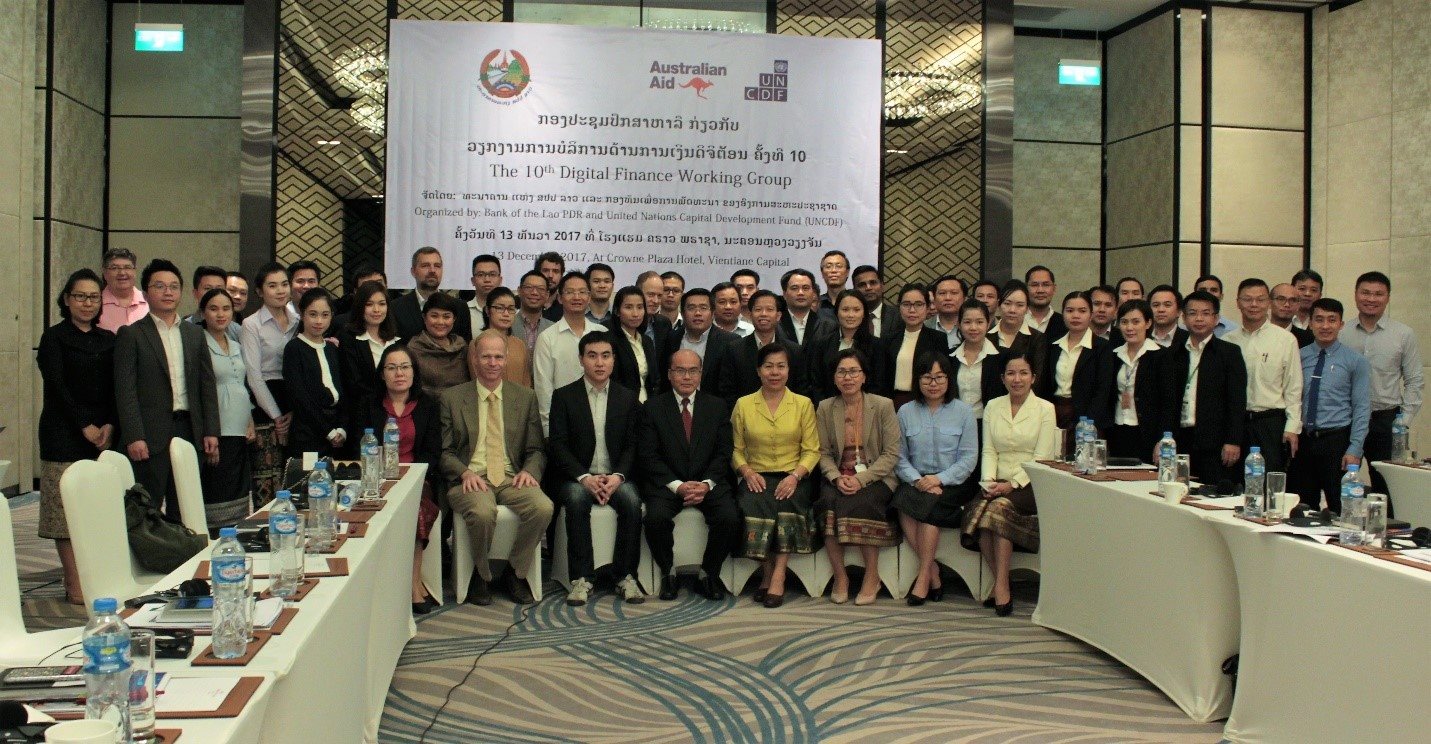
10th Digital Finance Working Group in Lao PDR is a clarion call for Digital Finance
On 12 May 2015, the first branchless banking transaction was completed in a rural village in the Lao People's Democratic Republic (Lao PDR).
Republished from the UNCDF MM4P website: https://www.uncdf.org/article/3302/10th-digital-finance-working-group-in-lao-pdr-is-a-clarion-call-for-digital-finance
On 13 December 2017, the 10th Digital Finance Working Group (DFWG) was convened by UNCDF1 and the Bank of the Lao PDR2 (BoL) with the generous support from the Australian Government. Under the chairmanship of BoL, this event marked a milestone for digital financial services (DFS) in Lao PDR. Not only it is the 10th meeting a milestone, showing the commitment of BoL and the engagement of the industry, but it also highlighted a new era of digital payments in Lao PDR.
More than 60 representatives from banks, mobile network operators (MNOs), microfinance institutions and government stakeholders were acquainted with the recently ratified National Payment System (NPS) Law.
The NPS law has secured passage in the National Assembly on November 7th and is expected to be signed into law in Q1 2018. The emergence of this new policy instrument will:
- Give clarity to the industry about the roles they could play within the digital finance ecosystem.
- Mandate the creation of a payments department within BoL to issue licensing to both payment service providers and payment system operators.
- Pave the way to bring innovative, accessible and affordable payment solutions to Lao PDR.
“With emerging demand for quick access to financial services and success stories of existing products in South East Asia, Lao’s digital finance sector has also been witnessing progressive changes. For digital payments or mobile money to work in any market- collaboration is the key! There needs to be a strong dialogue and a sturdy partnership between MNOs, banks and third parties to work towards developing digital solutions that can reach the broadest portion of the population. “- Nopphorn Danchainam, Managing Director of Digio, a pioneering payment systems provider in Thailand.
Towards the end of the programme, BCEL spoke of new updates to their BCELOne mobile banking application, which has a current client base of 70,000 registered users. In November 2017, BCEL introduced the third release of its BCELOne application with an added feature of QR Payments known as OnePay. It allows account holders to make instant mobile payments to vendors simply by scanning the merchants QR code. This domestic payment service is first of its kind in Lao PDR, with a standards-based solution that will integrate into the NPS infrastructure and allow interoperability with other providers over time. BCELOne previously integrated into the UNCDF-supported BCEL Community Money Express (BCOME) service, which allows banked customers to send payments to anyone in the country using the application. Funds can then be collected from the banks’ branches or more than 200 agents nationwide. You can read the detailed case study of BCOME here and watch the video about BCOME’s pioneering role in DFS in Lao PDR.
The DFWG has served as an excellent industry forum for discussion, knowledge sharing and promotion of a new suite of services in the Lao financial services market. Looking ahead to the 11th DFWG, BoL with the support of UNCDF aspires to promote the creation of action-oriented sub committees or taskforces that can address the challenges of delivering more innovative services in Lao PDR.
1.Through the in-country joint programme with BoL Making Access to Finance More Inclusive for Poor People (MAFIPP) and the global thematic initiative MM4P↩
2.Lao People’s Democratic Republic↩
For more information, please contact:
KM Consultant
DFS Expert, Lao PDR
Or visit mm4p.uncdf.org
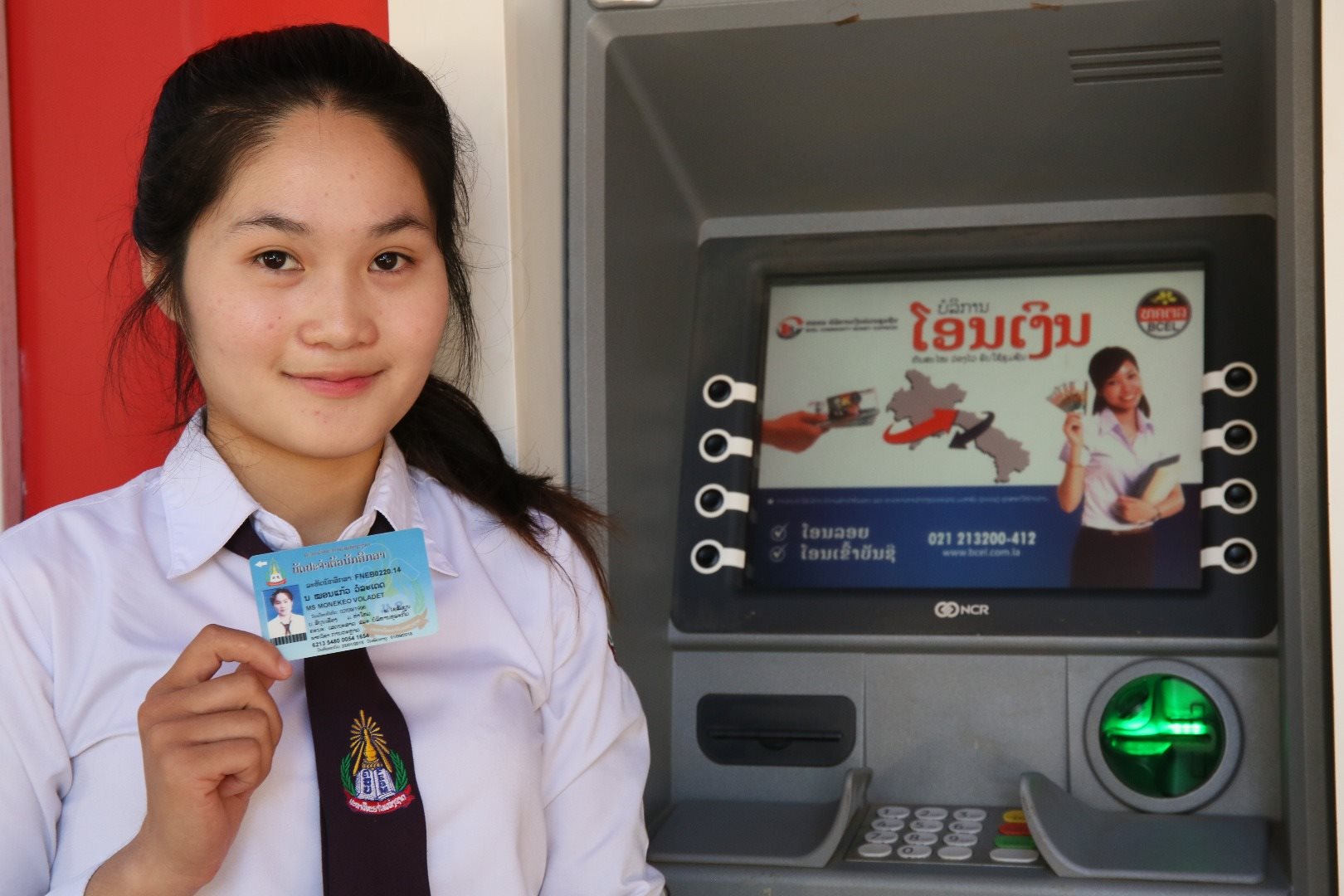
Community development through digital finance in Lao PDR
Sending children away from home for higher education is considered a requirement for parents to build their children’s future.
Republished from the UNCDF MM4P website: This article was first published on 21 June 2017 at https://www.uncdf.org/article/2512/community-development-through-digital-finance-lao
Using branchless banking to support education, agribusiness and more
There is an old Lao saying, ‘If you don’t go out of the village, you will not see the land far away; if you don’t go study, you will not have any knowledge.’ It is still commonly used in the Lao People's Democratic Republic (Lao PDR)—a country with a surge in demand for education, with 78% of youth enrolled in lower secondary education[1] while 56% of adults have primary education or less[2] (see the figure for more detail). Sending children away from home for higher education is considered a requirement for parents to build their children’s future. So, there is little surprise that sending money to support children’s education has become a primary use case for the first branchless banking service in Lao PDR.
Banque pour le Commerce Extérieur Lao Public (BCEL), one of the country’s leading banks, developed the branchless banking service, which is called BCEL Community Money Express (BCOME). It is entirely new; no other bank offers this kind of service in Lao PDR. Supported by United Nations Capital Development Fund (UNCDF) and its national implementation programme Making Access to Finance More Inclusive for Poor People (MAFIPP) and PHB Development, BCEL launched BCOME
in June 2015 with a small pilot of only 11 agents. Today, with more than 125 agents in every province of the country, BCOME has more than doubled the size of the BCEL branch and service unit network. Villagers perceive BCOME as convenient, quick, safe and friendly, the latter because it is offered by someone they know in their community—a neighbour, relative or acquaintance in town whom they can trust and with whom they can comfortably share their needs.
Figure from
FinMark Trust and UNCDF-Making Access Possible, FinScope Survey Highlights: Laos 2014, p.9 (n.p., November
2015).
© UNCDF MM4P
Agriculture is the backbone of the Lao economy, but farmers are dispersed, living in remote, rural areas throughout the country. Travelling to a district town can be an undue burden for them, and accessing formal financial and banking services is even more difficult both because of the distance to a bank branch and because of insufficient income and low financial literacy. These challenges have understandably led farmers to depend on cash. For them, sending money to family members in other provinces by a bus driver is a method often used, but it is time consuming and sometimes risky.
Sompong Veosy, a farmer from Souvannaphoum Village in Paklai District, grows rice and raises buffalo and cows for his income. He normally spends all day looking after the rice paddy and livestock, only leaving his farm after sunset. Taking time from his work to travel to town to complete a transaction is exhausting. But, since a BCOME agency in his village opened, his outlook has changed. “In the past, I had to travel a long way to send money to my children for their education, but now it is easy, fast and convenient. I am very, very happy now. It is perfect,“ he explained with a happy smile.
Sompong Veosy, a farmer from Souvannaphoum Village in Paklai District.
© UNCDF MM4P
The BCOME service has drawn this new customer segment to BCEL, which has been surprised to learn just how much money from rural farming communities flows throughout the country. Through the service, BCEL can stay close to these new customers and learn about their requirements.
Thong Khoun, a villager from Thakokhai in Pakngum District, regularly sends money through BCOME to her son who is studying in the southern part of the country. Sometimes, though, it is the opposite: she has an urgent expense of her own, and her son sends money back to her. “My son asked me to open a bank account so that he can send money to me in the future. So, I wish that BCOME can open the account here. It is convenient because it is close to our house,” Ms. Khoun explained. “I used to ask the agent if I can open my account with her. I want to save money, and I also want to have an ATM card. I feel that I don’t want to carry cash anymore. If I have a card, wherever I go I can withdraw money from the machine—that is what I want now. If we can open the account with BCOME, it would be wonderful,” she added.
BCOME is not only a solution for farmers to support their children’s education, it also allows them to have more opportunities to trade their products more broadly—helping them to break free of poverty. It helps farmers increase their income by providing a quick and easy payment system. BCOME responds directly to the needs of communities with a service that old-fashioned banking cannot provide. Siavone Phomavong, an agent in the capital city of Vientiane, shared an example: “I have a customer who sells organic vegetables. He sends money to buy them from farmers in Pakse, Champasak Province.” The BCOME service assists the growth of agribusinesses, as the money from buyers in the main cities flows out to farmers in the provinces, where the farmers can save and re-invest for better techniques and more productivity.
The access afforded by branchless banking does not only support education of farmers’ children and their agribusiness, it is also suited to many different types of business requirements, such as paying for insurance and making monthly payments for the purchase a car. Early adopters who have experienced the efficiency of the first branchless banking service in Lao PDR have greater understanding of the new system and value the system more. It benefits them in many ways, relieving stress in their lives and reducing the time and the cost of transactions, which in turn gives them a chance to save and thereby prepares them to take a first step out of the poverty trap.
In the future, BCOME will continue to grow with new product and service offerings and to play an important role in accelerating the growth of all kinds of businesses. The convenience and accessibility can be applied to any customer segment, from low-income populations who deal in small transaction amounts to large organizations that can network with people in any isolated region. These advancements will contribute to a greater number of people improving their livelihood by using a low-cost, easy and friendly system, which will drive the economy of the household and in turn the communities that form the core of the country’s wealth.
This is the second blog post of a series about the dawn of digital financial services in Lao PDR. Read also "Agents—The revolution on the ground in Lao PDR" for an agent's perspective.
June 2017. Copyright © UN Capital Development Fund. All rights reserved.
The views expressed in this publication are those of the author(s) and do not necessarily represent those of the United Nations, including UNCDF, or their Member States.
[1] Lao People’s Democratic Republic, Ministry of Education and Sports, Education and Sports Sector Development Plan (2016–2020) (Vientiane, December 2015).
[2] FinMark Trust and UNCDF-Making Access Possible, FinScope Survey Highlights: Laos 2014 (n.p., November 2015).
For more information, please contact:
Aliska Bajracharya
KM Consultant, Lao PDR
http://mm4p.uncdf.org
David Kleiman
DFS Expert in Lao PDR
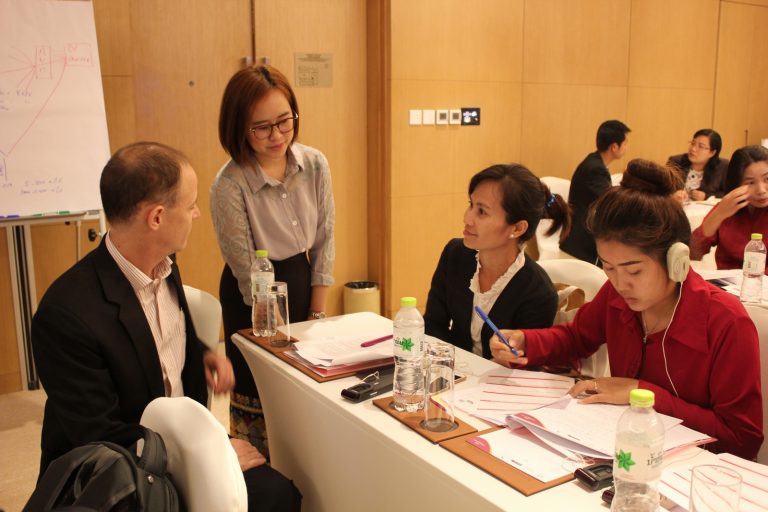
Building digital financial service networks in Lao PDR
building multiple and varied relationships within this developing environment for digital financial services (DFS).
Digital finance expert David Kleiman shares insights from programmes with UNCDF
David Kleiman came to Lao PDR as a Digital Finance Expert from PHB Development for the United Nations Capital Development Fund (UNCDF) programme MMP4 in 2014. Since that time, David has focused on building multiple and varied relationships within this developing environment for digital financial services (DFS). He shared views on the objectives and impact of his work.
Can you briefly describe your core objectives to enable DFS?
In 2013, when UNCDF MM4P started, there was no regulatory framework or guidelines – and therefore no service providers either. In order to jump-start engagement, UNCDF MM4P applied a market-development approach to creating an ecosystem for DFS to take root and flourish in the country. Much of our success to date has come from a focus on three pillars of engagement:
David Kleiman, left, in Lao PDR
- A strong and growing relationship with the central bank, Bank of the Lao PDR (BoL), to develop guidelines and regulations for providers who aim to offer DFS and to promote a positive exchange between industry, BoL and the government in general.
- A direct strategic relationship with UNCDF partners – to promote, support and manage various project activities and to align their business objectives with UNCDF and BoL’s goals for financial inclusion.
- Broader stakeholder engagement with banks, microfinance institutions, Mobile Network Operators, and even startups to promote activity in the field of DFS.
When UNCDF provides support to enable implementation, partners also commit through their leadership and resource mobilization. It’s through these relationships with stakeholders that UNCDF can generate impactful projects and therefore catalyze the introduction of meaningful services for rural customers.
What can you say about the design and implementation process?
Any effective strategy must take into account the needs of people and the capacities of organizations in the country. Lao PDR currently has one implementation of DFS through agency banking; BCEL’s Community Money Express (BCOME), which allows people to do basic banking close to home. Before BCOME, customers had to travel to a bank branch – of which there are only 700 in the country. Today BCOME has more than 140 agents, so it represents both a turning point for the country and a significant improvement in the points of access for financial services. The upcoming launch by Unitel of their mobile wallet will add another significant dimension to the ecosystem.
What are some unique aspects of working with UNCDF on this?
Within Lao, UNCDF works jointly with BoL in a national implementation program called MAFIPP (Making Access to Finance more Inclusive for Poor People). This joint structure strengthens our communication with stakeholders and solidifies their commitment. Goals are aligned because of joint project nature, which can also help extend the use of DFS services to achieve aims such as enrolling in education, accessing better healthcare and more.
What are the changes you have seen, especially considering a human-centered design approach (HCD)?
In a new market like this, ambitions should be aligned before selling a financial service. It’s important to take demographics into account and to consider what really matters for the people – and why.
UNCDF has worked in numerous countries and has lots of talented people who understand best practices – particularly in engagement and impact. PHB Development has been working internationally with UNCDF on multiple DFS projects in Africa and Asia. The relationship between PHB and UNCDF is significant, and we can gain action-based insights from it. We listen to customers and providers who have aspirations – then work together to develop an implementation path based on best practices while developing services and solutions which are highly contextualized for each country.
MM4P AT A GLANCE
MM4P is a programme launched by UNCDF in partnership with the Swedish International Development Agency (Sida), the Australian Department of Foreign Affairs and Trade (DFAT), the Bill & Melinda Gates Foundation and The MasterCard Foundation. MM4P provides support to digital financial services (DFS) in a selected group of least developed countries (LDCs) to demonstrate how the correct mix of financial, technical and policy support can build a robust DFS ecosystem that reaches low-income people in LDCs.
For more information, visit mm4p.uncdf.org or follow @UNCDFMM4P and UNCDF MM4P on LInkedIn.
2 June 2017
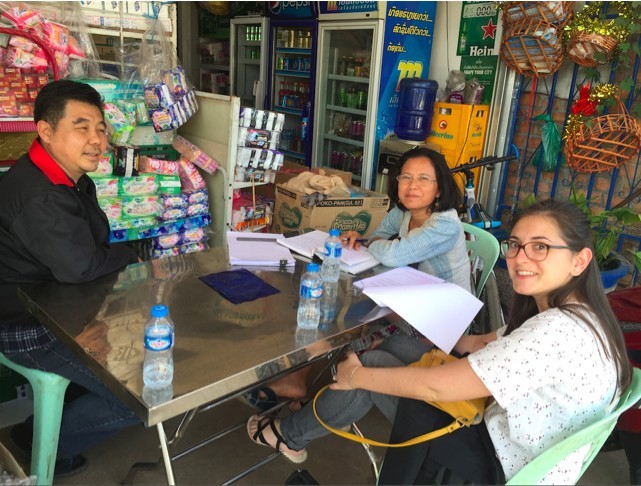
Human Centered Design Study
PHB consultant Lisa Chassin recently completed a Human Centred Design study in Lao PDR with UNCDF and Unitel for the introduction of the first-ever mobile wallet.
Human-centered Market Research in Lao PDR
PHB consultant Lisa Chassin recently completed a Human Centred Design study in Lao PDR with UNCDF and Unitel for the introduction of the first-ever mobile wallet. Lisa shared her insights on the needs and culture that she experienced.
What were the reactions of local people towards the introduction of Mobile Wallets?
Potential clients were generally keen and curious about how mobile wallets function. It was perceived as an interesting alternative to brick and mortar branches, where it is time-consuming to transact (travels, long queue, no place to park, etc.). Younger people were enthusiastic because they saw mobile money as a modern solution that would help them enhance their future. A few were reluctant because cash is deeply rooted in the local culture, and new technology can be intimidating.
We tried to identify different categories of people – personas – that were addressed separately. The goal was to identify what is specifically important to each group and what could trigger the adoption of e-wallets for these specific users. Personas we produced are on the UNCDF MM4P blog: http://uncdf.org/en/human-centered-market-research-develop-first-mobile-wallet-lao-pdr
What was the most memorable experience you had on the introduction of the first-ever mobile wallet in Lao PDR?
I was impressed by women’s lead in household
finances and business management decisions. And, I noticed this when talking to
men – not women. A shop owner told me about how he enjoyed working as a tourist
guide before he met his wife. When they married, she decided that the best
economic decision for them was to take over his father’s shop, “So that is what
we did,” he said. And a young man said he was giving all his salary to his
girlfriend, because “she would manage it better; I don’t trust myself with money.
With her, I know it is safe.”
When designing a financial product, these insights are very important! We
realised that we had to give an important voice to women, to acknowledge and
highlight their role as financial managers and meet their specific needs,
especially through a targeted communication strategy.
Did women show any interest in the product – and in what aspect, if so?
Yes, for example, women entrepreneurs appreciated the convenience of remote and fast transactions without going to a bank. Young tech-savvy girls were excited to have a new and affordable tool to manage their thin budgets. I would not say there is a gender-specific interest, because men were also quite interested in using the e-wallet, but women were generally more eager, due to their money management responsibilities.
What were the biggest immediate impacts of this project/research that you could see?
Helping Unitel’s team identify their targets and providing actionable insights for the product pilot launch were key contributions. Based on newly-gained insights, we brainstormed with the U-money management team to unlock product development and distribution strategy issues. One outcome was that marketing changed from product-centred to human-centred communication, in which people could better identify with the product. Unitel appears to embrace the human-centric approach by its willingness to test future product changes with clients.
What long-term impacts could you see and in what areas?
In the longer run, Unitel’s objective is to reach the underserved population in rural areas of Lao PDR, where nearly 80% of the total population and the majority of the unbanked people live. With a saving culture in the country (77% of adults save according to a recent Finscope study) and the high mobile penetration (78%, GSMA, 2017), U-money can provide a safe, affordable and easy-to-use financial enabler for underserved rural households.
Did you face any particular challenges in carrying out this research?
At first, many of the people were reluctant to participate in the study. On one hand, it was difficult for them to spare the time from their routines, but they were also a bit shy and reluctant to talk about themselves in detail. This was a challenge because we needed to immerse ourselves in their lives and culture in order to reveal their motivations and behaviours for the study to be productive.
To overcome this, we had to put extra emphasis on presenting who we were as people and give personal details about ourselves first in order to initiate a two-way conversation. Eventually, they spoke, we listened, and valuable insights were shared to help us better design an authentic human-centric approach.
Further about the research: Ms Latsamy Thammavong, Chief of Business Department at Unitel, said, “Through this [HCD] approach we can now understand the aspirations of our customers – which is very important when building a trusted financial service. Unitel is in a good position to support financial inclusion with our new services due to our network, distribution and large customer base. We also get support from PHB experts to suggest useful information for our product planning.”
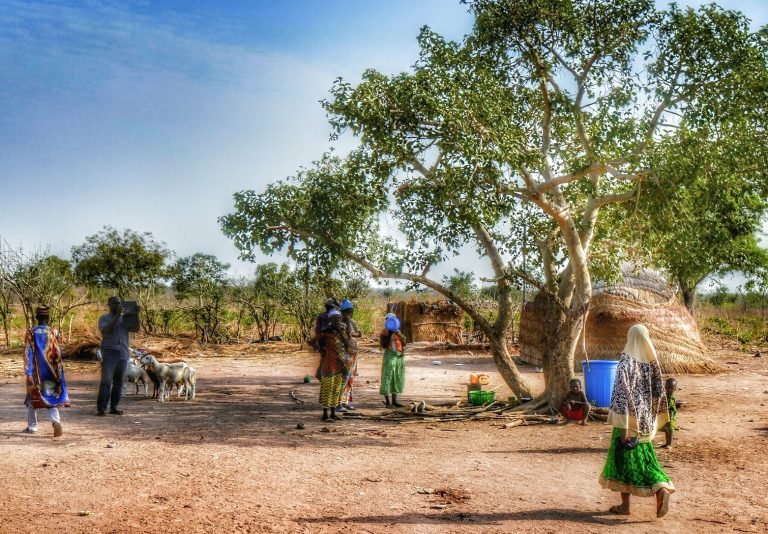
Rural Development & Financial Inclusion
People in rural and low-income areas can now open new economic opportunities to participate in even basic systems which they previously could not access.
Alone no more: Rural Communities finding Financial Inclusion
Not so long ago, rural communities far away from urban centres of business were left with few external resources to build their economic activity and raise standards of living. This scenario has changed.
People in rural and low-income areas can now open new economic opportunities to participate in even basic systems which they previously could not access. An increasing number of microfinance institutions (MFIs) and other financial inclusion services are catering to the poor in rural areas and empowering people to provide for their own needs and to rise from impoverished situations.
The results are communities that are more productive and less vulnerable to natural and human risks. Safer housing structures, engagement in education, access to health care, and improved water/sanitation facilities are some benefits that are resulting.
Services such as small loans that enable basic entrepreneurship are simple operations with far-reaching impacts on the local economic cycle. Credit services are tailored for different consumers to meet their needs:
- Agriculture leases (helping farmers endure low seasons and thrive in good seasons)
- Education loans (investing in the future of the communities as a whole)
- Consumer loans (building potential for a healthy local exchange)
- Housing loans (enabling a more secure existence for families)
Remittance services are also popular in rural areas for family members to regularly transfer money to each other. Women, youth and the disabled are benefitting in particular from modern systems, as these groups may have been previously deprived of financial services and resulting earning opportunities.
Digital financial services (DFS) enable business transactions that also save users from the time and cost of travel to financial institutions. The savings accounts offered by MTN MoKash and Airtel Wewolw are examples of services with which people can save and access their money through mobile wallets without worrying about security issues.
Of course, there are risks for MFIs from issues such as high default rates that may discourage some providers. Making a positive social impact in challenging situations requires a certain level of commitment and expertise, and PHB Development is glad to be a leader in this sector of enabling low-income rural areas to become more prosperous and resilient.
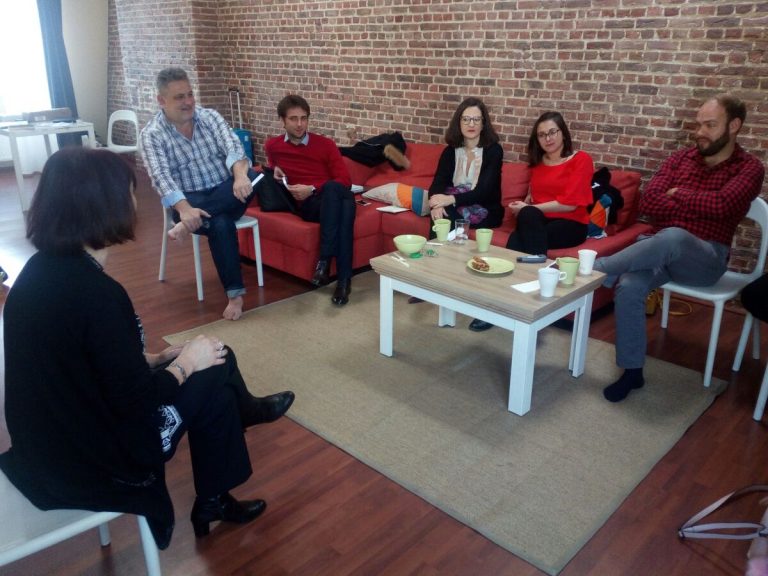
PHB Days 2017
The team of PHB Development partners and associates shares the goal of making a positive social impact with their work.
Inside the PHB Days Meetings: A Week of Strategic Review for Team Impact
The team of PHB Development partners and associates shares the goal of making a positive social impact with their work. To help accomplish this, twice a year they come together from different parts of the world to enhance strategies in providing the best service in all countries of operation.
The latest session of PHB Days took place in Brussels on 3-7 April, resulting in expanded ideas on innovations for greater financial inclusion. Everyone benefits when a cohesive team equipped with fine-tuned strategies sets out to tackle challenges in developing regions.
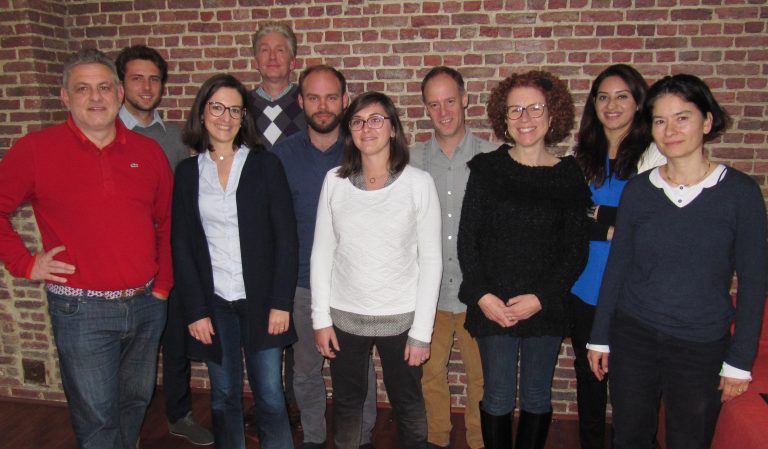
The week kicked off with team training on non-violent communication skills. Exercises exposed participants to some situations that they may encounter “in the field,” and practice was on how to work in a manner that is well received by all. Team members used empathy in conveying messages in a respectful manner to another party, thus enabling more effective client management. “This training revived the reality that we’re all different, in our needs in life and work, our feelings, our reactions to the same situation, our way of expressing ourselves and understanding the others. It’s crucial to learn from this rich training,” said Philippe Breul, founder of PHB Development.
Analysis of current and potential operations was carried out in the following sessions throughout the week, with the aim of adapting methods to evolving needs of clients. It was inspiring to see everyone’s contributions toward this common goal. Brainstorming groups also allowed team members to test their experienced-based ideas with colleagues. Some ideas were winners – and others quickly fizzled out – but all participants benefited from the exchange.
Although the PHB Days training objectives are serious, the atmosphere is warm and casual. Newer associates naturally become integrated so that synergies can flow for the most productive output from and for the organization while keeping a focus on PHB values of cultural awareness and inclusion. “The social mission of PHB includes its partners and associates: it is a horizontal organization that wants its people to be the best they can be,” said Ronald Everts, PHB associate
And of course, the week is not all work. Evening outings for dinner and cultural experiences provide a balance to further propel a feel-good way of working together.
21 April 2017
Matt Luna & Sana Himayat
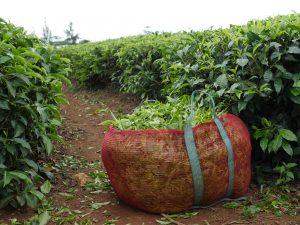
Digital Financial Services: Bringing Stability to Small Farms so They Can Grow
The use of DFS such as agricultural microcredit can lead to key contributions in the improvement of value chains, from the timely acquisition of quality raw materials to the methods of storage and implementation.

How Digital Financial Services help smallholder farmers
Smallholder farmers are realising the benefits of on-demand digital financial services (DFS) to help improve farm resilience to unexpected conditions and to acquire funds for investing in better materials. As a result, many low-income farmers are increasing the consistency and quality of their yields – even as they conduct transactions while in the fields.
The use of DFS such as agricultural microcredit can lead to key contributions in the improvement of value chains, from the timely acquisition of quality raw materials to the methods of storage and implementation. Similarly, agricultural leases provide farmers with options to use helpful tools and products that would otherwise not be available to them.
And with increased yields, what about ensuring fair deals when selling their produce? Farmers can use digital agri-info systems that provide updates on current market prices – and weather forecasts – so they are equipped with this information before making transactions. DFS also allows buyers and sellers to make instant transactions, thus increasing trust and strengthening relations that benefit their farming business in the long run. Mobile Wallets – a way to use credit or debit card information on a mobile device – is a related service that provides a better sense of security when handling transaction funds in the presence of others.
DFS technology is even being used to mitigate emerging threats from nature. Microinsurance can provide a “safety net” for risks to farming, including from increasingly unpredictable weather patterns caused by climate change. Without such protection, farmers’ basic survival against uncontrollable elements can be less certain.
Financial and IT companies are increasingly working together to create digital financial products, such as MoKash, to optimise results for farmers who may operate near subsistence level to improve their livelihoods. The broader impact of these initiatives, as a result, becomes more visible in the overall economic improvement of the countries.
31 March 2017
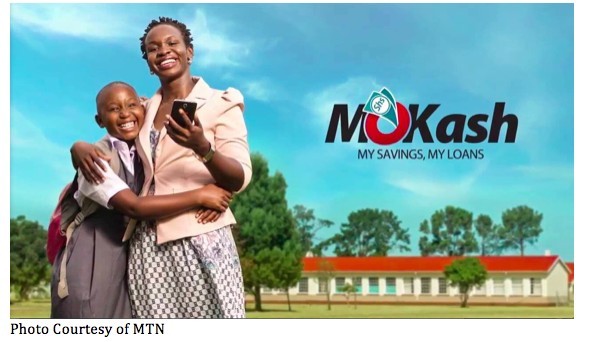
MoKash is Calling Up a Future of Mobile Financial Possibilities in Uganda
MoKash is helping more than a million subscribers when and where they need to meet opportunities and demands that require ready access to money.
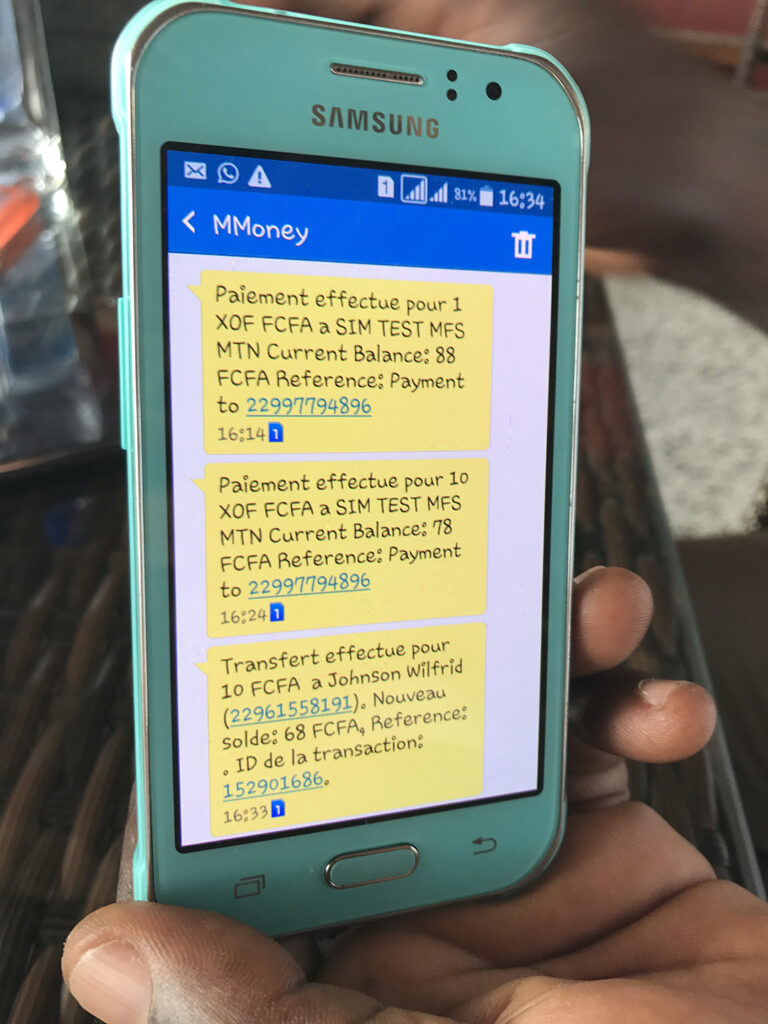
How Mokash is helping
Students, farmers, and small business owners in Uganda are discovering a user-friendly way to access loans and build savings through mobile phones. Launched in August 2016, MoKash is helping more than a million subscribers when and where they need to meet opportunities and demands that require ready access to money.
Customers can build savings in small amounts over their phone with the Commercial Bank of Africa (CBA), as well as borrow money almost immediately when needed, provided they have been using the MTN mobile network for at least 6 months. MoKash also features less waiting time for loan application approval through the use of artificial intelligence in processing history checks. For savings, the MoKash deposit account enables customers to earn up to 5% interest on amounts that can be built up with an auto-save function to prepare for business, education, and unexpected needs. “It’s a good way of saving and accessing loans with improved security,” said Edward Oyam, businessman.
The Mokash MTN Product
This innovative cash management product is operated with the support of the United Nations Capital Development Fund (UNCDF) and Mobile Money for the Poor (MM4P) – in collaboration with the consulting firm PHB Development. The implementing organizations MTN Uganda and its partner, the CBA, aim to provide low-income people with access to financial services that can make a positive impact on their livelihoods. As a result, a growing range of customers are benefitting from an easily-accessible approach to mobile financial services:
- Quick access to loans allows parents and students to borrow money when needed to pay for education fees and materials.
- Customers avoid the transport cost and time to visit a bank, enabling broader groups of people, especially in rural areas, to be economically productive.
- MoKash allows individuals to take out loans without needing to be within a group, and without extensive collateral requirements.
On MoKash and the future, Brenda Oyam, student, said, “I need loans for school fees and emergencies, but I would also like to save small amounts…I hope to use it to improve my life.”
21 March 2017
